ON THIS PAGE:
See the column to the left for a list of all the films on this page.
Films are listed in alphabetical order by title.
SOURCES
In the list below, please note some titles are marked with a star (★) and “By Palestinians” and/or with two asterisks (**) and “with study guide.”
Web addresses are provided for films that have their own website.
“Available online” indicates the film doesn’t have its own website, but:
it may be purchased or rented online from such retailers as Amazon, iTunes and others,
OR
it may be viewed online at such sites as YouTube, Vimeo, and others.
A Google search should provide you with the locations of these films online: http://google.com
STUDY GUIDES
See titles below with two asterisks (**) and “with study guide,” for those films that have such materials. Links to get those materials are included in the descriptions.
In our CURRICULA section, find other video materials (that are not feature films) which have study guides.
JVP-BOSTON FILM LIBRARY – borrow films for free
The Boston chapter of Jewish Voice for Peace has a library with dozens of films about Israel/Palestine that can be borrowed for free. The most recent year of these films is 2018. Find many of the titles listed below. See the film collection and download it.
Do you know films that are missing from this list?
Let us know at: [email protected]
![]()
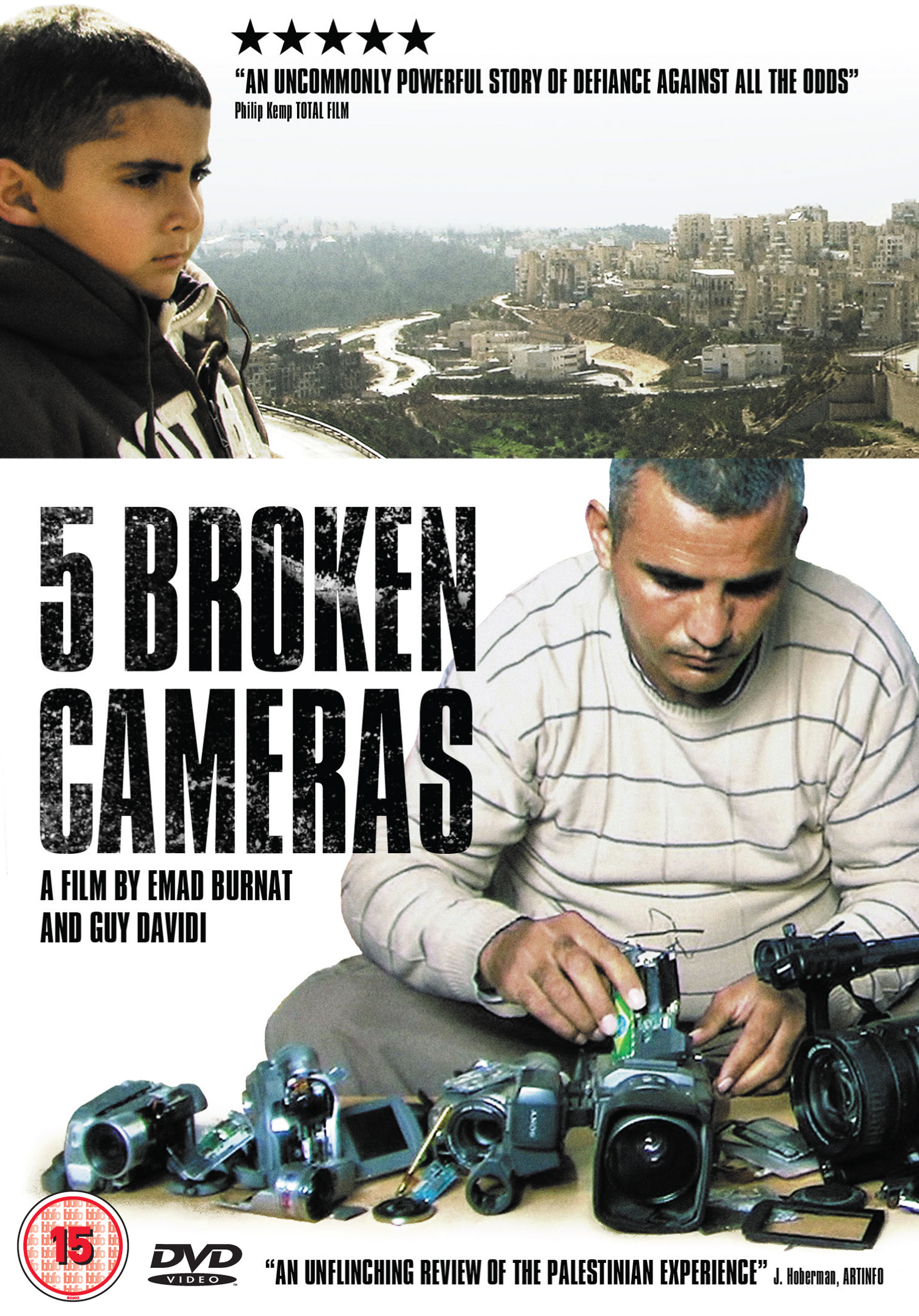 ** ★ 5 Broken Cameras – 2012 (1 hr, 34 min)
** ★ 5 Broken Cameras – 2012 (1 hr, 34 min)
With study guide; By Palestinians
http://5brokencamerasthemovie.com
The first-ever Palestinian film to be nominated for a best Documentary Feature Academy Award,, the critically-acclaimed film 5 BROKEN CAMERAS is a deeply personal, first-hand account of life and non-violent resistance in Bil’in, a West Bank village surrounded by Israeli settlements. Shot by Palestinian farmer Emad Burnat,
who bought his first camera in 2005 to record the birth of his youngest son, Gibreel, the film was co-directed by Burnat and Guy Davidi, an Israeli filmmaker.
Structured in chapters around the destruction of each one of Burnat’s cameras, the filmmakers’ collaboration follows one family’s evolution over six years of village upheaval. As the years pass in front of the camera, we witness Gibreel grow from a newborn baby into a young boy who observes the world unfolding around him with the astute powers of perception that only children possess. Burnat watches from behind the lens as olive trees are bulldozed, protests intensify and lives are lost in this cinematic diary and unparalleled record of life in the West Bank.
Watch it on Netflix: https://www.netflix.com/title/70229917
Also available with other streaming services or for purchase online.
See purchase and other options at: http://5brokencamerasthemovie.com/
See there also an invitation to host a lecture or screening for a school or organization.
AFSC Study Guide for 5 Broken Cameras (8 pp)
This discussion guide has been developed by Palestine-Israel Program staff members of the American Friends Service Committee (AFSC). The guide is intended to help facilitate discussion about the film 5 Broken Cameras by social action groups, classes, and other interested parties. We hope that discussion of this important film becomes a vehicle for developing a greater understanding of the issues involved in the Israeli-Palestinian conflict and nonviolent resistance in Palestine. The film guide is divided into four sections.
The first section provides a brief summary of the film and brief background and context information about the village of Bil’in.
The second section provides brief background information on Palestinian nonviolent resistance to Israel’s occupation.
Section three includes sample questions which can be used to guide discussions about the film and information about resources that interested individuals and groups can use to find out more about the situation in Bil’in, in Israel and Palestine, and about actions they can support that will help bring change.
The final section is a case study developed based on interviews conducted by AFSC in Bil’in.
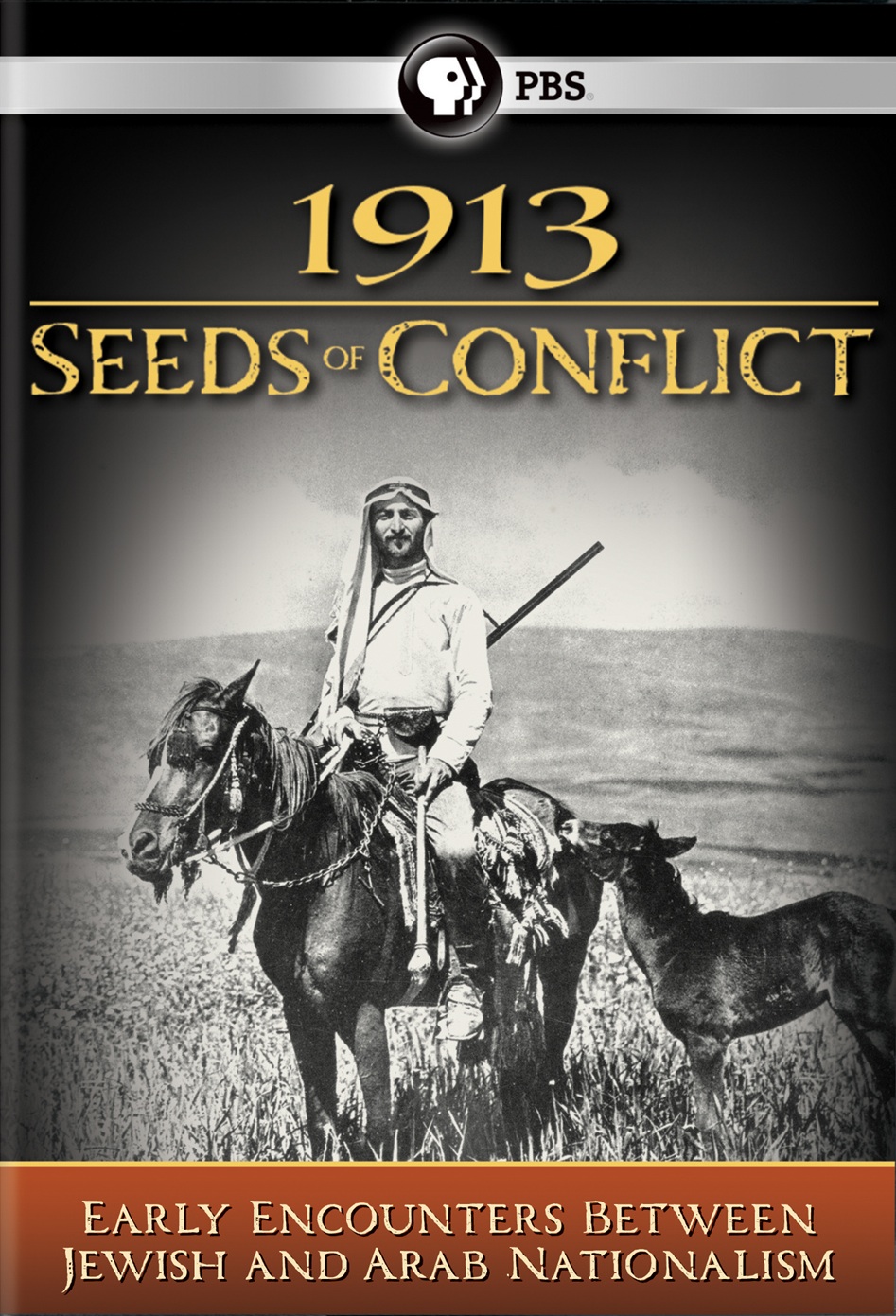 1913: Seeds of Conflict – 2015 (5 episodes, about 12 hours total)
1913: Seeds of Conflict – 2015 (5 episodes, about 12 hours total)
http://www.pbs.org/program/1913-seeds-conflict/
It is the overlooked legacy of World War I. 1913: Seeds of Conflict looks at the moment of transformation when Ottoman rule in Palestine was still strong, the identities of Jerusalemites were fluid and few could imagine the conflict that would dominate the region for the next century. Until now, the public and scholars have focused on the British Mandate as the matchstick of the Middle East conflict. Breaking new ground, this film focuses on the moment just before World War I, when Arab and Jewish nationalism first made contact, and the seeds of conflict were first sewn.
The story’s setting is multi-cultural, multi-lingual Ottoman Palestine, a colorful society being pulled between medieval and modern influences, with community alliances built on personal ties. The district of Jerusalem (later southern Palestine) is sensing growing nationalism and perceived threats to Ottoman sovereignty by European “foreigners.” Zionism, the European-based movement for a Jewish homeland, and Arab nationalism — still nascent — are the forces that propel the narrative.
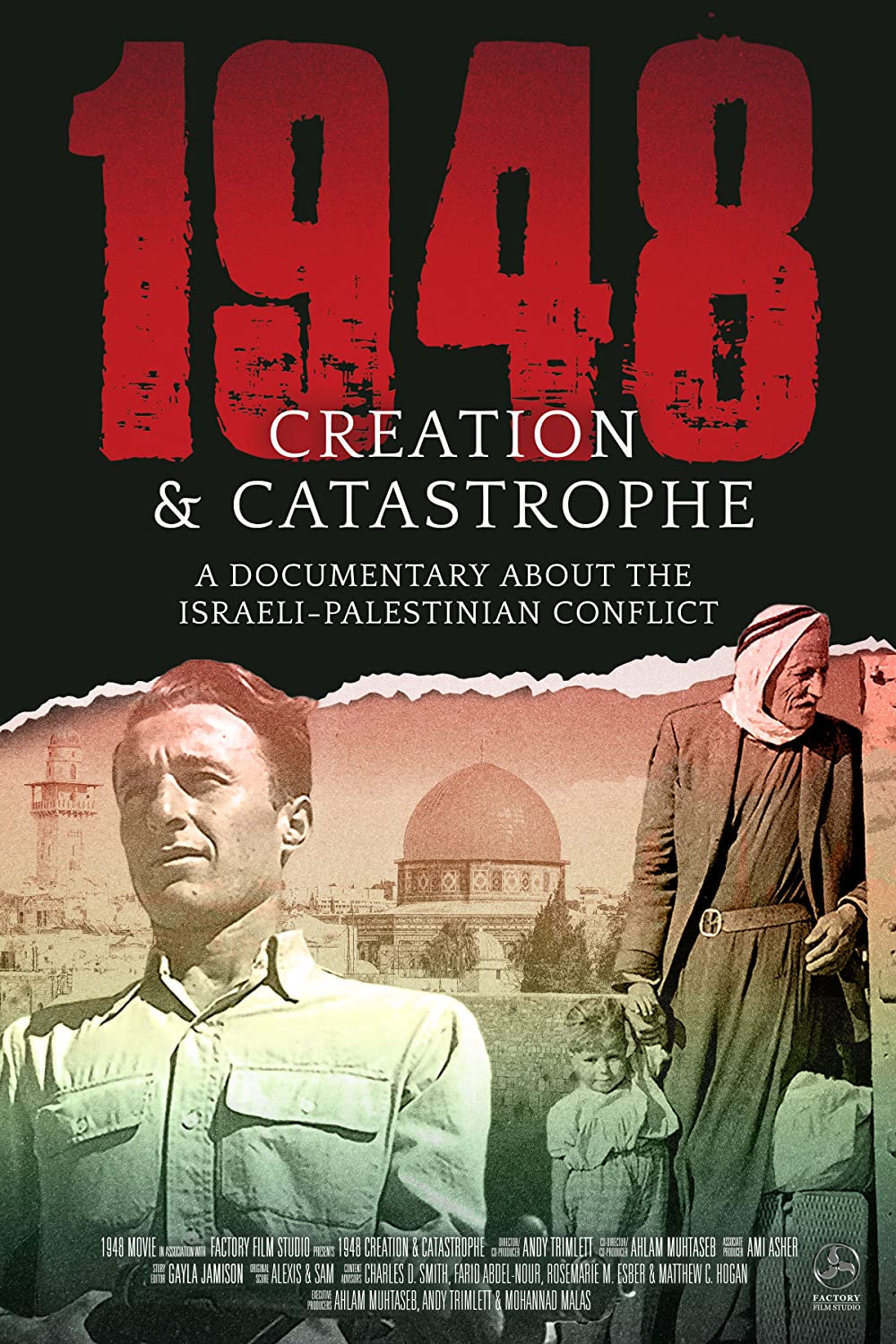 1948: Creation & Catastrophe – 2019 (1 hr, 25 min)
1948: Creation & Catastrophe – 2019 (1 hr, 25 min)
https://www.1948movie.com/
The story of the establishment of Israel as seen through the eyes of the people who lived it. Rather than being a history lesson, this documentary is a primer for the present. It is simply not possible to make sense of what is happening in the Israeli-Palestinian conflict today without an understanding of 1948.
Through riveting and moving personal recollections of both Palestinians and Israelis, 1948: Creation & Catastrophe reveals the shocking events of the most pivotal year in the most controversial conflict in the world. It tells the story of the establishment of Israel as seen through the eyes of the people who lived it. It is simply not possible to make sense of what is happening in the Israeli-Palestinian conflict today without an understanding of 1948. This documentary was the last chance for many of its Israeli and Palestinian characters to narrate their first-hand accounts of the creation of a state and the expulsion of a nation.
The documentary includes interviews with veterans, refugees, survivors and historians of the war collected in Palestine, Israel, Jordan, Lebanon, the United Kingdom, Canada and the United States. Those who lived through the war are the centerpiece of the story, but respected historians, including Charles D. Smith, Avi Shlaim, Nur Masalha, Benny Morris, Ilan Pappe, Rashid Khalidi and Sharif Kanaaneh provide context for the events.
What People Are Saying
“It is fair and even-handed in its telling of a wrenching, difficult history that features the perspectives of Israelis who saw the 1948 war as their War of Independence, and Palestinians who experienced it as their Nakba, or catastrophe.”
-Sandy Tolan (Author, The Lemon Tree), Truthdig
“1948 makes the Nakba uncannily real for the doubting spectator.”
Terri Ginsberg (University of Cairo), Arab Studies Quarterly
Reviews from the iTunes Store
“I’m a university teacher and this documentary has been consistently part of my teaching materials.”
“There are many good films about the Israel/Palestine situation, but 1948 is the best for fully understanding the context for what has been happening”
“This movie was a transformative one for my understanding of what exactly happened in 1948”
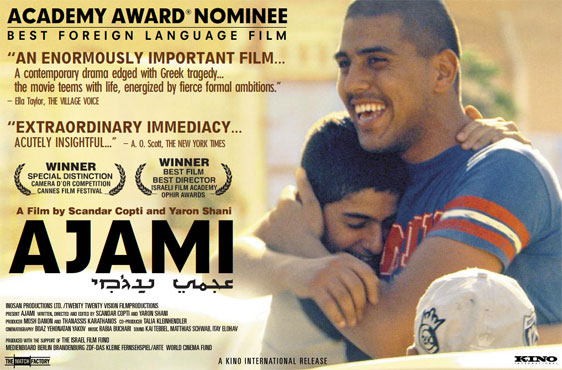 Ajami – 2009 (2 hr, 4 mins)
Ajami – 2009 (2 hr, 4 mins)
Available online
Nominated for 2010 Oscars, for best foreign film. Ajami is a run-down district in Jaffa where Jews, Muslims and Christians live in close proximity. Thriller plot is intertwined with Romeo-and-Juliet style story and gritty social issues. The direction and acting are so good that you empathise with all the key protagonists; you also gain some insight into what life might be like in the lower echelons of Israeli society.
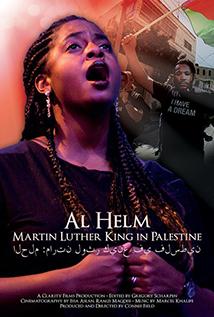 Al Helm: Martin Luther King in Palestine – 2013 (1hr, 33 min)
Al Helm: Martin Luther King in Palestine – 2013 (1hr, 33 min)
http://www.clarityfilms.org/mlk/index.html
From Connie Field, the director of classics like The Life and Times of Rosie the Riveter and Freedom on my Mind, comes the new documentary film Al Helm (The Dream).
We went to the Holy Land with Dr. Clay Carson, who runs the Martin Luther King, Jr. Institute, to film his play about King performed by the Palestinian National Theatre and an African-American gospel choir which was presented to audiences all over the West Bank. It was an intense cultural exchange between two peoples encompassing the joy of new friendships, creative collaborations and eye opening experiences. No one who participated remained unchanged.
We traveled through the Holy Land that the Christian choir were so passionately excited to see, as they were introduced to the other side of the land where Jesus once walked: a man whose front yard has been bisected by the Security Wall and whose children have to play in the dust of its continued construction; the ease with which they as foreigners were able to pass through checkpoints while their Palestinian counterparts took hours to navigate the same distance; a home which had no water because a settlement had taken over their well, where Palestinian women teach them songs in Arabic and join them in singing American gospel songs. And yet, amidst the hardships of occupied life, the choir is greeted with food, humor, and generosity, a mixture that brought some of them to tears.
Our film brings a fresh perspective in understanding the realities of Palestinian life under occupation and introduces people to the young Palestinians who are changing the landscape non-violently.
“AL HELM is a great piece of documentary film making which brings together themes of cultural differences and understanding, human rights and injustice, and the power of nonviolent action in ways which the audience can better understand the reality of life in Palestine through the experiences of ordinary, yet remarkable, individuals. It is the first film to explore parallels between the civil rights struggles in the U.S. and the liberation struggles in the occupied Territories.”
Stephen Zunes, Professor of Politics, University of San Francisco
“…AL HELM is utterly unique. It shows artists meeting across worlds; it refracts the fierce and appalling political situation through the lenses of theater; it weaves together threads of suffering and courage, political activism and artistic creation; it creates revelatory conversations between African Americans and Palestinians.”
Dr. Linda Hess, Religious Studies, Stanford University
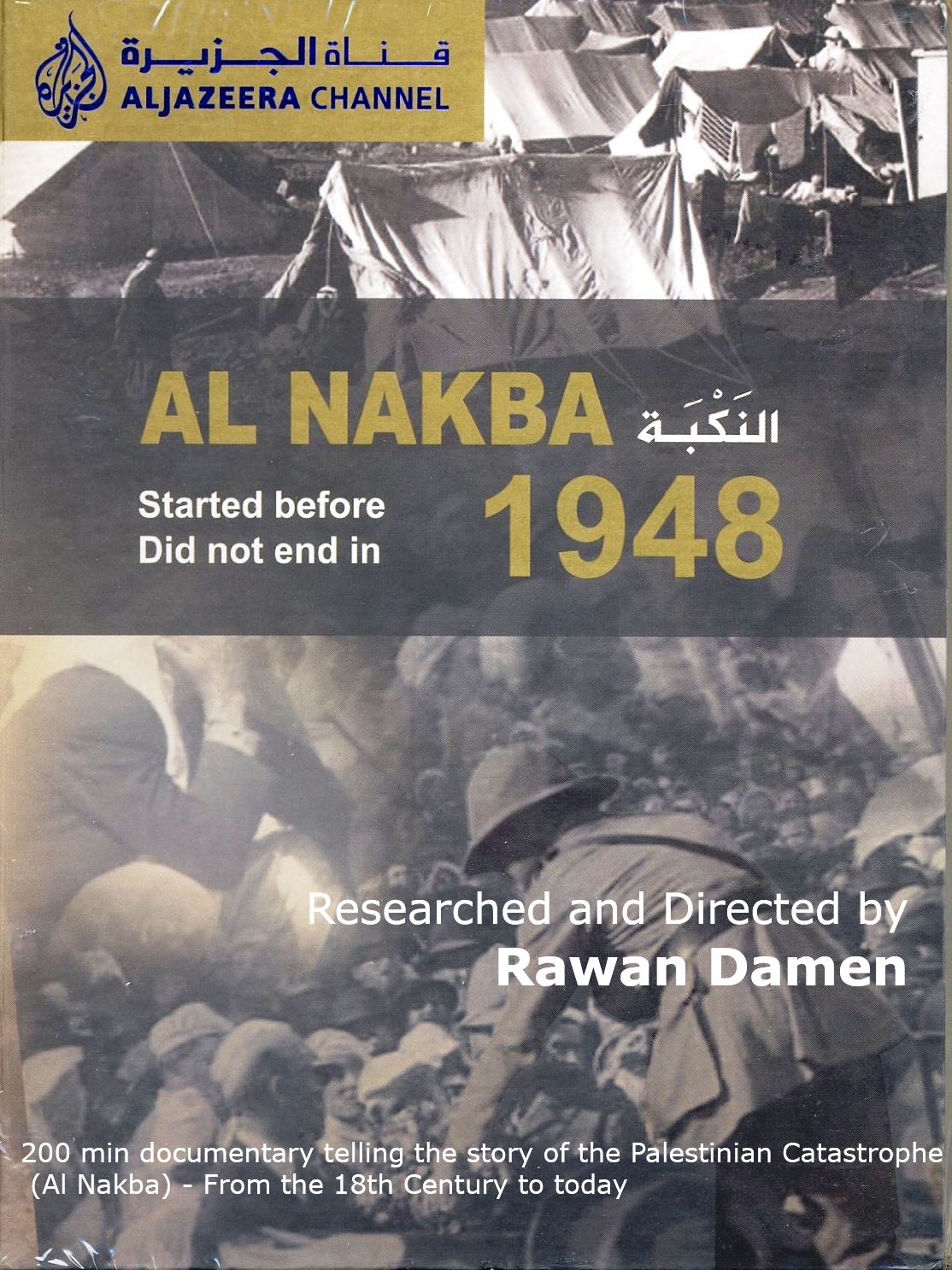 Al Nakba – 2008 (in 4 parts-3 hr, 20 mins total)
Al Nakba – 2008 (in 4 parts-3 hr, 20 mins total)
Watch all four episodes online
A four-part series produced by Al Jazeera on the expulsion of Palestinians in 1948.
It spans the 19th and 20th centuries, including the British Mandate in Palestine and comes up to date, with the ongoing ethnic cleansing of Palestine. Arab, Israeli, and Western intellectuals, historians, and eye-witnesses provide the central narrative which is accompanied by archive material and documents, many only recently released for the first time.
“The Nakba did not begin in 1948. Its origins lie over two centuries ago….”
So begins this four-part series on the ‘nakba’, meaning the ‘catastrophe’, about the history of the Palestinian exodus that led to the first Arab-Israeli war in 1948, and the establishment of the state of Israel.
This sweeping history starts back in 1799 with Napoleon’s attempted advance into Palestine to check British expansion and his appeal to the Jews of the world to reclaim their land in league with France. The narrative moves through the 19th century and into the 20th century with the British Mandate in Palestine and comes right up to date in the 21st century and the ongoing ‘nakba’ on the ground. Arab, Israeli and Western intellectuals, historians and eye-witnesses provide the central narrative which is accompanied by archive material and documents, many only recently released for the first time.
Since first running on Al Jazeera Arabic in 2008, this series has won Arab and international awards and has been well received at festivals throughout the world.
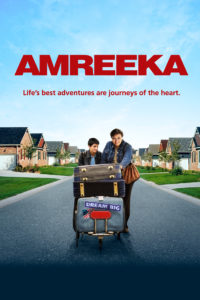 Amreeka – 2009 (1 hr, 37 min)
Amreeka – 2009 (1 hr, 37 min)
Available online
Amreeka is a fictional film documenting the story of the divorced Palestinian Christian Muna Farah, and her son Fadi, following their immigration from the Palestinian Territories to Illinois, America. Though undeniably heart-warming, and at times wickedly funny, the film highlights the difficulties of living as a Middle Eastern immigrant in a country still reeling from the impact of 9/11. Dabis’ film tackles issues of race, religion and gender through the stoic and immensely likable Muna, making the concept of cross-cultural immigration universally relevant, with heartfelt humor and sincerity.
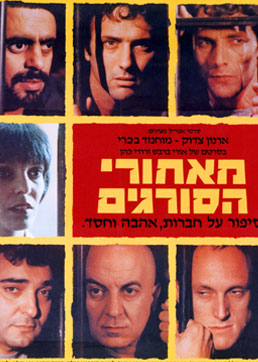 Beyond the Walls – 1984 (1 hr, 43 min)
Beyond the Walls – 1984 (1 hr, 43 min)
Available online
In Israel’s Central Prison, the security officer is corrupt, supplying drugs and stirring the hatred between Jewish and Arab prisoners to his advantage. Uri, in for 12 years for armed robbery, and Issan, in for 50 years for PLO violence, command the respect of their cells. When the Arabs are framed for the murder of a Jewish prisoner and a young inmate commits suicide rather than lie about what happened, Uri and Issan form an unlikely partnership, leading the security block on a strike. Prison officials try to break it. In the background are Uri’s daughter and Issan’s wife, women of beauty and passion who embody the distance from inside a cell to the outside
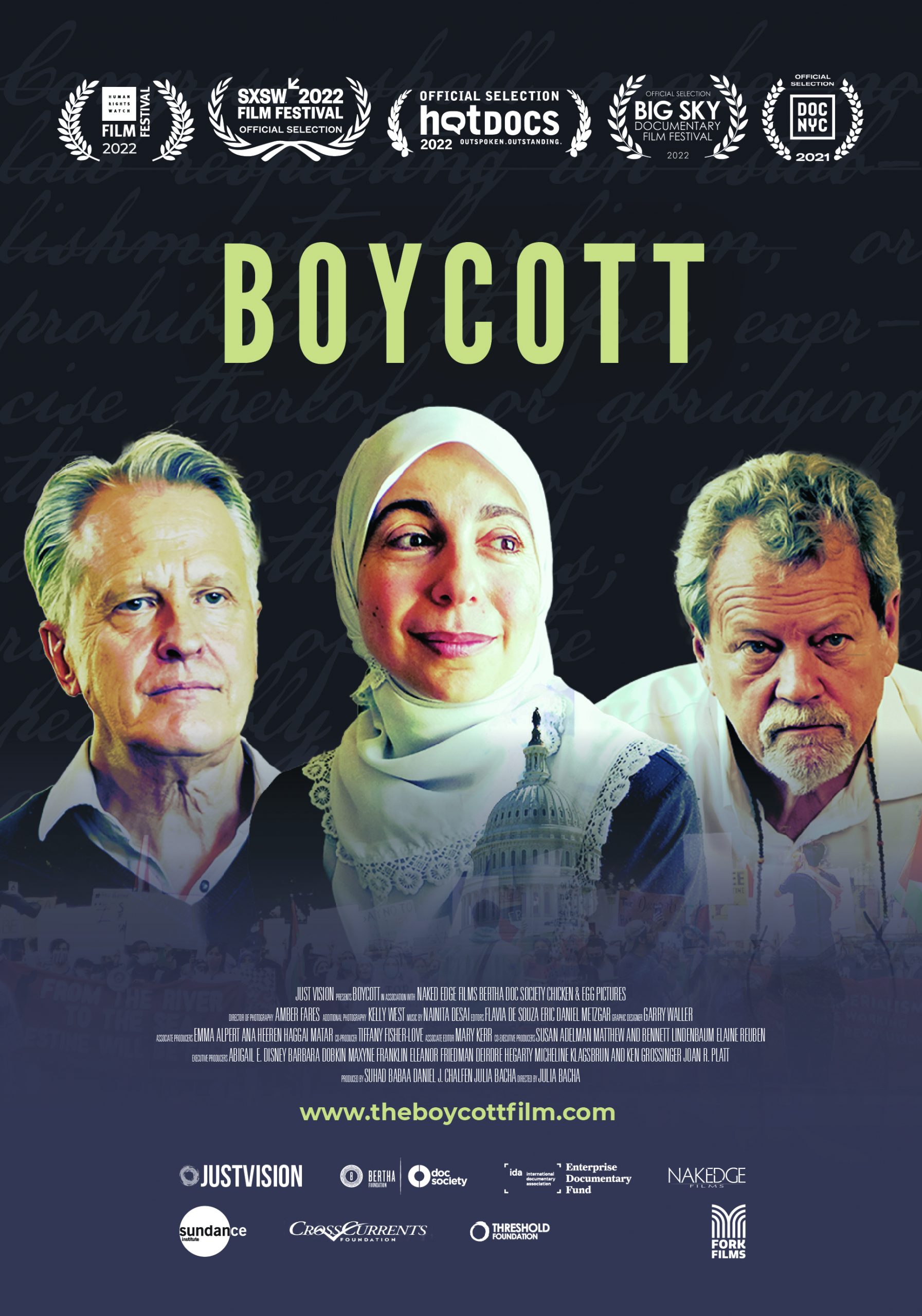 Boycott – 2021
Boycott – 2021
Not yet available online (Sept. 022)
https://justvision.org/boycott
When a news publisher in Arkansas, an attorney in Arizona, and a speech therapist in Texas are told they must choose between their jobs and their political beliefs, they launch legal battles that expose an attack on freedom of speech across 33 states in America.
Boycott traces the impact of state legislation designed to penalize individuals and companies that choose to boycott Israel due to its human rights record. A legal thriller with “accidental plaintiffs” at the center of the story, Boycott is a bracing look at the far-reaching implications of anti-boycott legislation and an inspiring tale of everyday Americans standing up to protect our rights in an age of shifting politics and threats to freedom of speech.
——-
Over the past six years, unbeknownst to most Americans, 33 states passed laws intending to silence boycott and other nonviolent measures aimed at pressuring Israel on its human rights record. These dangerous bills remove the legal protection that has been awarded to boycotts for generations, granting governments the power to condition jobs on political viewpoints.
As this wave of anti-boycott legislation has swept through the country, so has a counter-wave in defense of freedom of speech. Everyday Americans are challenging these laws for their constitutionality in a nation-wide battle likely to go all the way to the Supreme Court.
With full access to the plaintiffs and in revelatory moments with elected officials, Boycott chronicles one of the most consequential First Amendment battles of the past few decades and investigates the question – how did we get here?
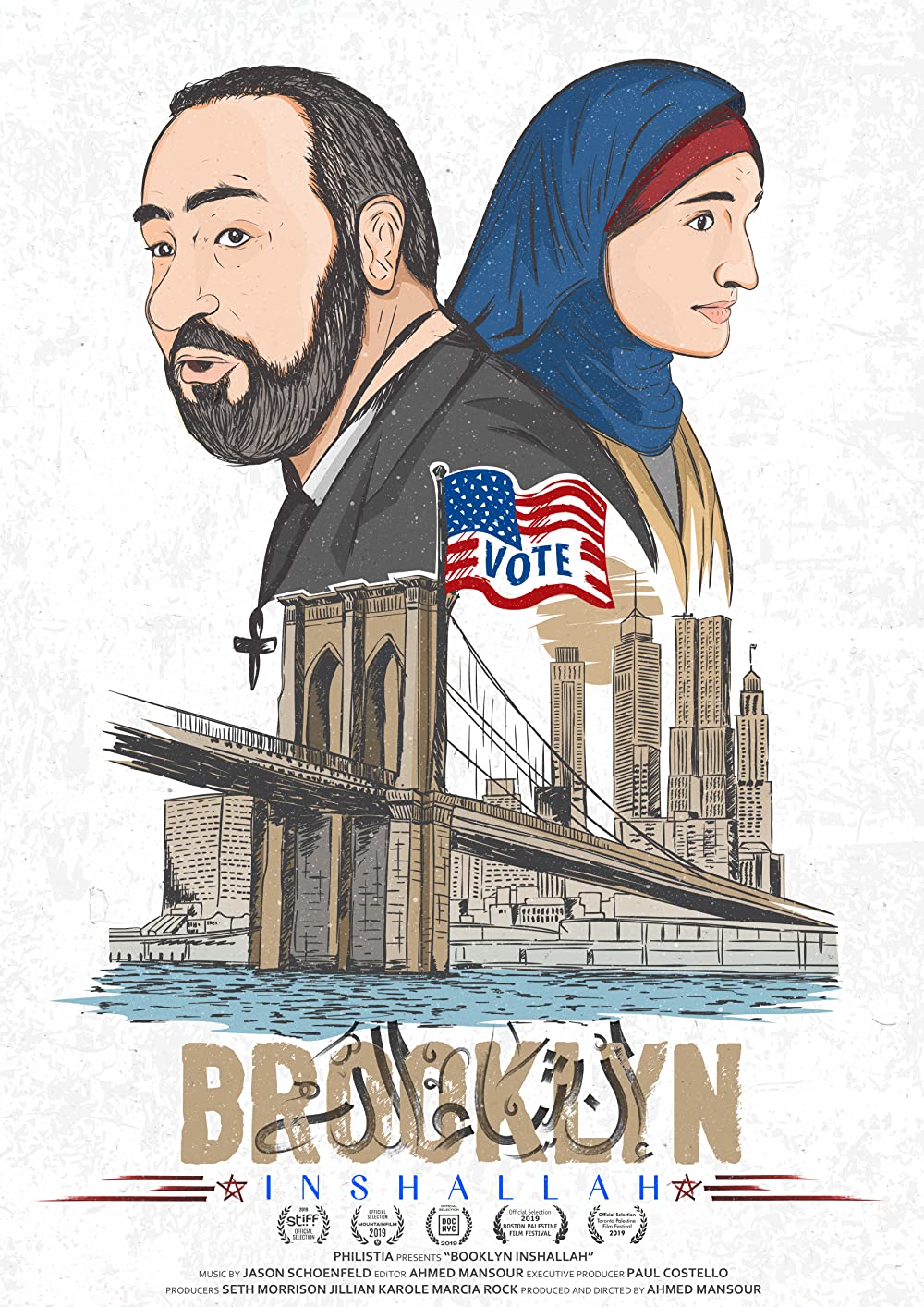 Brooklyn, Inshallah – 2021 (52 min)
Brooklyn, Inshallah – 2021 (52 min)
https://www.brooklyninshallah.com/
Watch it here: https://worldchannel.org/episode/america-reframed-brooklyn-inshallah/
Brooklyn, Inshallah follows three genuine Americans: an Arab Lutheran pastor running for NYC Council, Muslim activist Linda Sarsour, and a local community organizer, Aber Kawas.
Father Khader El-Yateem, is a Palestinian American Pastor and long time resident of BayRidge, Brooklyn. With the support of local organizers and activists, including Aber Kawas and Linda Sarsour, he launches a campaign for a seat on the city council. To win, Father El-Yateem and his team will have to overcome many campaign hurdles including: voter misinformation, language barriers at the polls, and outright prejudice. If he wins, he would be New York City’s first Arab American councilman.
As grassroots energy coalesces around Father Khader El-Yateem’s bid to make history, his campaign promises to change Bay Ridge forever. BROOKLYN INSHALLAH captures both the polarizing divisiveness of American politics and the power of civic participation in local government. The story of Khader El-Yateem and his supporters shows all Arab Americans and non-Arab Muslims that they too can build their political power and have a voice inAmerican politics.
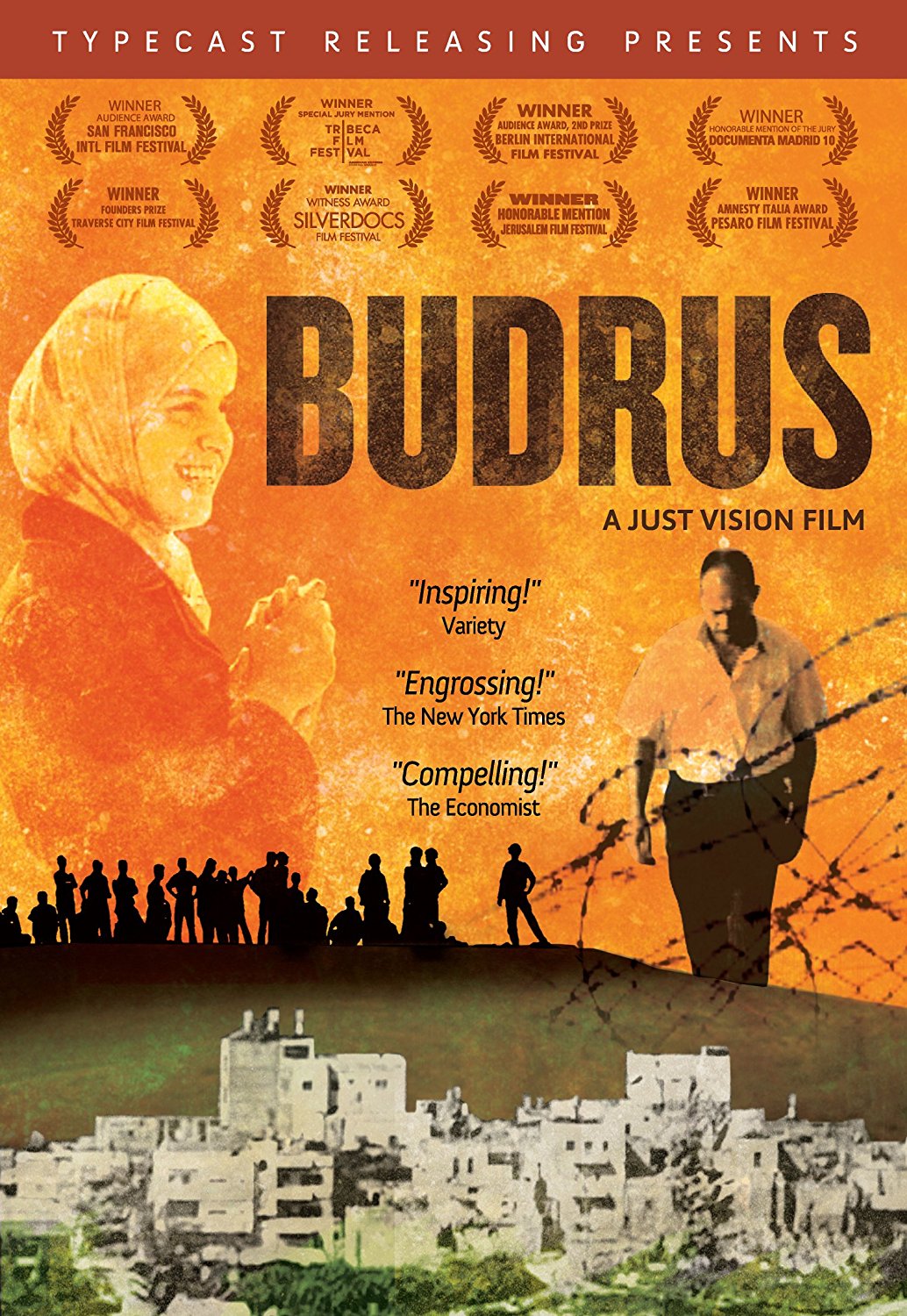 ** ★ Budrus – 2010 (1 hr, 22 min)
** ★ Budrus – 2010 (1 hr, 22 min)
With study guide; By Palestinians
http://www.justvision.org/budrus
Budrus is an award-winning feature documentary film about Palestinian community organizer, Ayed Morrar, who unites Palestinian political factions and invites Israeli supporters to join an unarmed movement to save his village of Budrus from destruction by Israel’s Separation Barrier. Success eludes them until his 15-year-old daughter, Iltezam, launches a women’s contingent that quickly moves to the front lines. Struggling side by side, father and daughter unleash an inspiring, yet little-known, movement in the Occupied Palestinian Territories that is still gaining ground today. In an action-filled documentary chronicling this movement from its infancy, Budrus shines a light on people who choose nonviolent strategies to confront a threat.
While this film is about one Palestinian village, it tells a much bigger story about what is possible in the Middle East. Ayed succeeded in doing what many people believe to be impossible: he united feuding Palestinian political groups, including Fatah and Hamas; he brought women to the heart of the struggle by encouraging his daughter Iltezam’s leadership; and welcoming hundreds of Israelis to cross into Palestinian territory for the first time and join this nonviolent effort. Many of the activists who joined the villagers of Budrus are now continuing to support nonviolence efforts in villages from Bil’in to Nabi Saleh to Hebron to Sheikh Jarrah in East Jerusalem.
While many documentaries about the Palestinian-Israeli conflict either romanticize the notion of peace, or dwell entirely on the suffering of victims to the conflict, this film focuses on the success of a Palestinian-led unarmed struggle.
Learn more about the film and how to bring it to your community:
http://www.justvision.org/budrus/about/faq
Watch Budrus online for a fee: http://www.justvision.org/budrus/watch
Also on Netflix and Amazon Prime
Purchase the DVD: http://www.justvision.org/store
Just Vision Discussion Guide for Budrus
A guide from the film’s producers, including such topics as Putting Budrus on the Map, Who’s Who, Pre-Screening Preparation, Discussion Questions, Media Analysis, Nonviolence & Movement Building, The Role of Women, Unity of Palestinian Political Factions, Israeli Participation, Israeli Military Presence, Top-Down vs. Bottom-Up Approaches to Change, and several appendices.
Palestine Teaching Trunk Discussion Guide for Budrus (2 pp)
Suggestions for introducing the film, questions to ask about the subject matter, and ideas for student projects in response to the film.
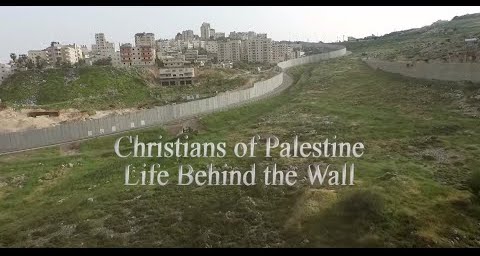 Christians of Palestine, Life Behind the Wall – 2017 (26 min)
Christians of Palestine, Life Behind the Wall – 2017 (26 min)
Watch it on Youtube: https://www.youtube.com/watch?v=1ZjRRs-v6eI
A documentary that focuses on how the Israeli Occupation impacts the Palestinian population of today. The story is told by Christian Palestinians including the (then) Mayor of Bethlehem, Mrs.Vera Baboun. Their interviews shed light on a different perspective of the conflict that we don’t hear about in the United States.
Come and witness the Christmas celebration and hopeful spirit of those living in the walled city of Bethlehem. This film conveys a message of peace, along with a deeper understanding of the issues those living under occupation face.
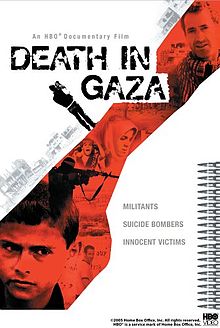 Death in Gaza – 2004 (1 hr, 20 min)
Death in Gaza – 2004 (1 hr, 20 min)
Available online
In spring 2003, filmmaker James Miller and reporter Saira Shah, following the success of their Peabody-winning films Unholy War and Beneath the Veil, set out to take a first-hand look at the culture of hate that permeates the Middle East. They captured the lives of three Palestinian children growing up in the bullet-riddled streets of Gaza, indoctrinated in the creed of Jihad, and had planned to show the Israeli side next. But on May 2, in the midst of filming, Miller was shot to death by an Israeli tank, falling victim to the conflict he covered. The America Undercover special Death In Gaza tells this tragic, eye-opening story. Death In Gaza begins in Nablas, where Miller and Shah witness an explosion that kills several Palestinians suspected of being suicide bombers. “We’re trying to understand how people learn to hate so deeply that they’re prepared to die in order to kill,” says Shah. “So we’re looking for the next generation, the children who will make either peace or war.” In Nablas, that generation is playing dangerous games with the Israelis, as children shower the tanks that patrol their street with rocks, taunting the soldiers inside.
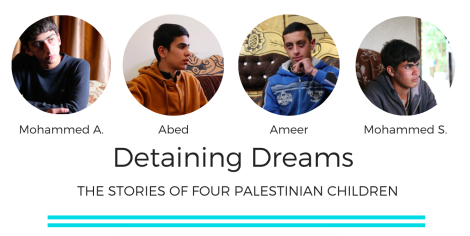 Detaining Dreams – 2015 (20 min.)
Detaining Dreams – 2015 (20 min.)
Available online
DETAINING DREAMS is an intimate documentary featuring the stories of four Palestinian children and their families undergoing the ordeal of Israeli military detention: arrested by Israeli forces in the occupied West Bank and prosecuted in the Israeli military detention system.
One facet of the Israeli occupation that has largely remained hidden from the public’s critical eye is the systematic abuse of children at the hands of Israeli soldiers and prison officials. Targeted because of their vulnerabilities, hundreds of Palestinian children cycle through rounds of violence and interrogation where they are often kept from communicating with the outside world. Beatings go hand-in-hand with interrogation techniques meant to wear the children down, and threats made against their families, friends, and neighbors are used to force false confessions over things as trivial as throwing stones or walking too close to an Israeli military installation. The No Way To Treat A Child campaign has produced this documentary with interviews collected in Palestine of children who have lived the experience.
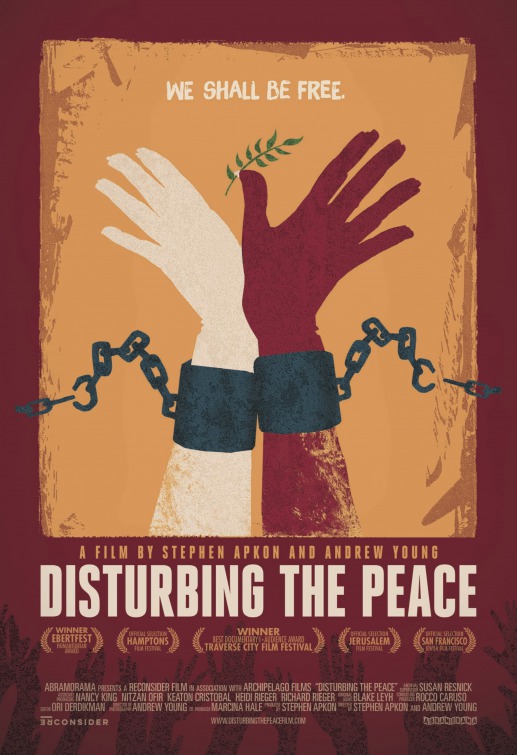 Disturbing the Peace – 2016 (1 hr, 23 min)
Disturbing the Peace – 2016 (1 hr, 23 min)
http://disturbingthepeacefilm.com/
“Disturbing the Peace” is a journey of people triumphing over stories. The film follows a group of former Israeli soldiers and Palestinian fighters who have laid down their weapons and are working together through non-violence to end one of the oldest, seemingly intractable narratives of our time. In the fertile grounds of compassion, Disturbing the Peace sheds light on something the mainstream media refuses to cover – that at some level, even as conflict among nations persists, peace already exists in the Middle East.
Combatants For Peace is an organization of former fighters on both sides of the Israeli/Palestinian conflict. From Israeli soldiers who grew up dreaming of heroism and served in the elite forces of the Israeli military to Palestinian fighters whose involvement in the armed uprising or Intifada led to serving years in prison – their only encounter with each other was in combat. Today they work not through weapons of war, but with weapons of peace, utilizing dialogue, theater and other cultural mediums in an effort to end the Occupation and to achieve a two state solution with respect for everyone. They face difficult challenges, from many in their own societies who call them traitors, to the outbreak of another round of war in Gaza, yet they know what is at stake. “Disturbing the Peace” follows these warriors in their quest for a peaceful end to the conflict and utilizes verite footage along with rich archival footage and other visuals The story unfolds in a way that enables the audience to examine their own narratives and imagine creative ways to end our own occupations and build the future that we want for all.
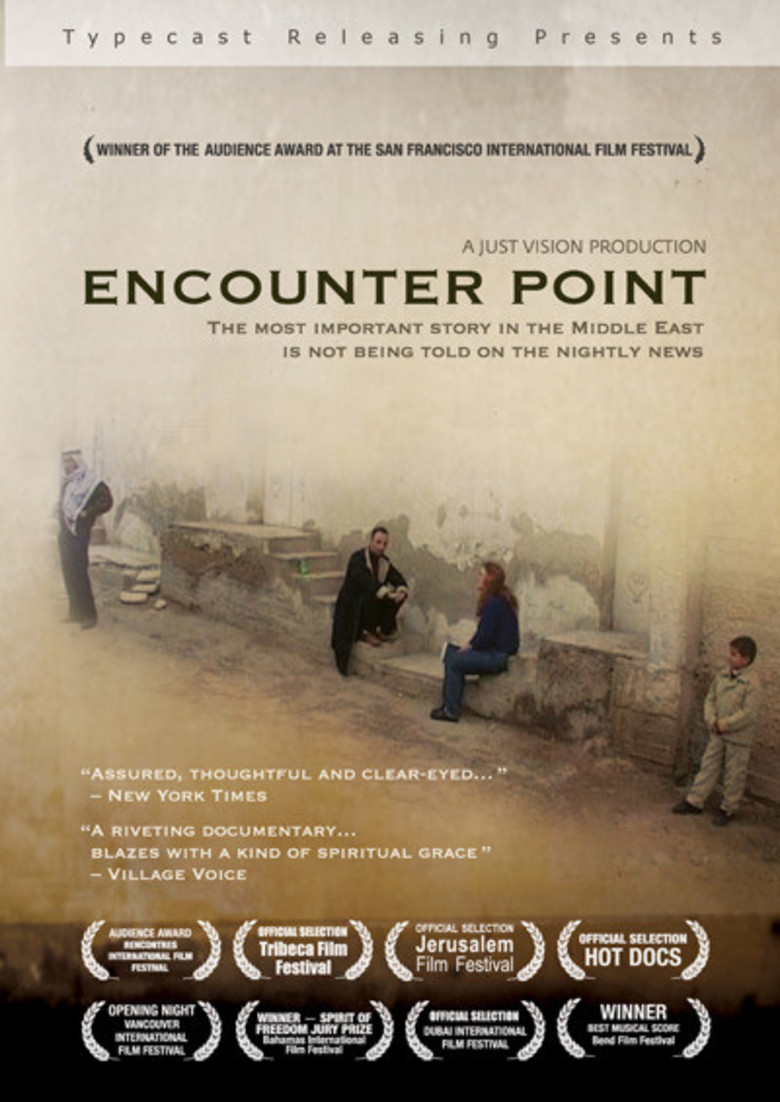 Encounter Point – 2006 (1 hr, 25 min)
Encounter Point – 2006 (1 hr, 25 min)
http://www.justvision.org/encounterpoint
Encounter Point is a documentary film that follows a former Israeli settler, a Palestinian ex-prisoner, a bereaved Israeli mother and a wounded Palestinian bereaved brother who risk their lives and public standing to promote a nonviolent end to the conflict. Their journeys lead them to the unlikeliest places to confront hatred within their communities. The film explores what drives them and thousands of other like-minded civilians to overcome anger and grief to work for grassroots solutions. It is a film about the everyday leaders in our midst.
For 2 years, the Just Vision crew followed the stories of ordinary people who feel driven to work for an end to bloodshed and occupation in favor of peace. We traveled from Tel Mond to Tulkarem, from Hebron to Haifa documenting the courageous, painful and moving stories of regular people who refuse to sit back as the conflict escalates. These civic leaders navigate suicide bombings and checkpoints to confront militancy on both sides, the wounded and apathetic masses.
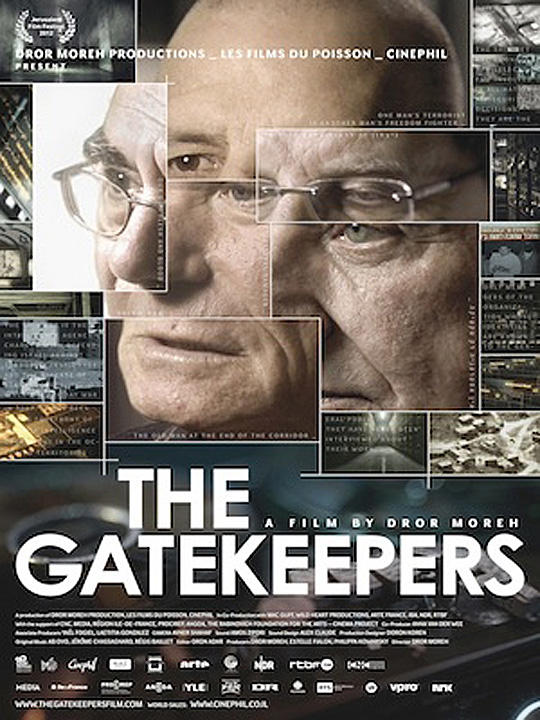 The Gatekeepers – 2012 (1 hr, 37 min)
The Gatekeepers – 2012 (1 hr, 37 min)
http://www.sonyclassics.com/thegatekeepers/
For the first time ever, six former heads of Shin Bet, the Israeli internal secret service, talk with breathtaking frankness about their work. What clearly amounts to torture is freely admitted, as are their methods of acquiring Palestinian informers and their accounts of targeted killings, in which they take especial pride (‘clean, elegant’), are particularly chilling. In the latter part of the film, the participants take a step back and consider what they have achieved. At the political level, they agree that their efforts have only strengthened the resistance, and the whole process has destroyed what they thought Israel stood for. The closing words sum it up: ‘We win the battles but we are losing the war.’
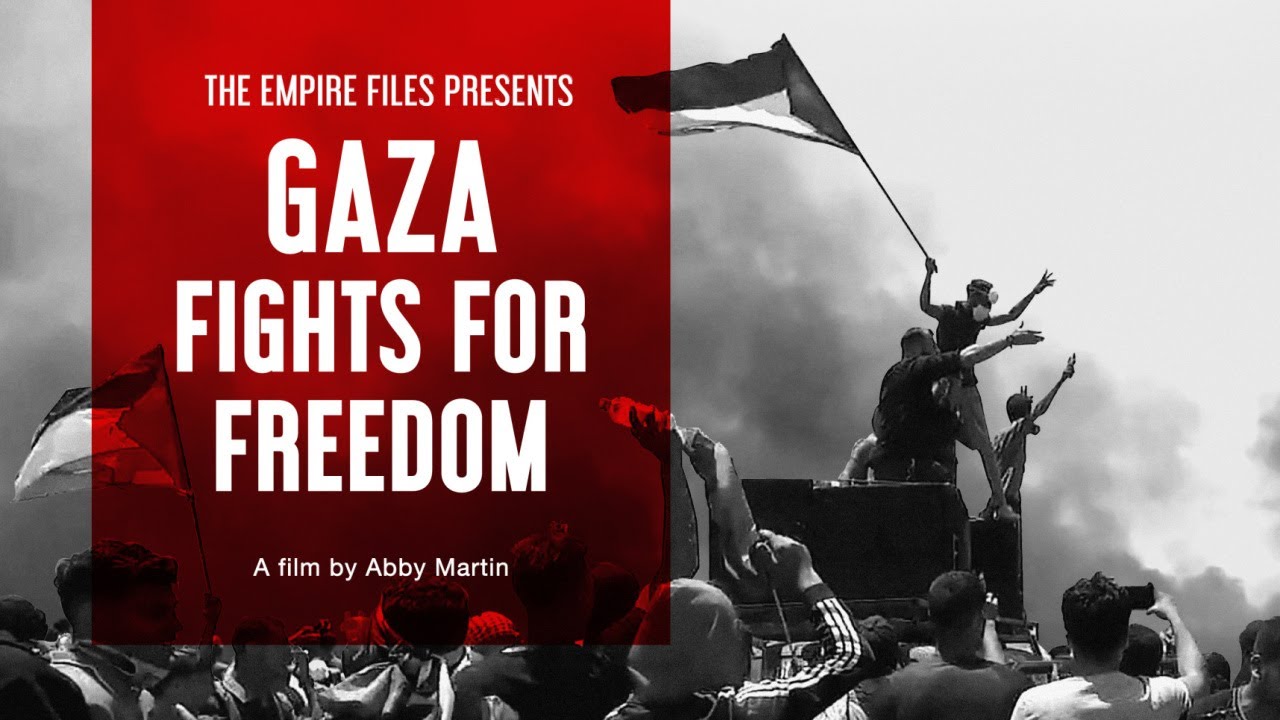 Gaza Fights For Freedom – 2019 (1 hr, 24 min)
Gaza Fights For Freedom – 2019 (1 hr, 24 min)
Watch it on Youtube: https://www.youtube.com/watch?v=HnZSaKYmP2s
This debut feature film by journalist Abby Martin began while reporting in Palestine, where she was denied entry into Gaza by the Israeli government on the accusation she was a “propagandist.” So Abby connected with a team of journalists in Gaza to produce the film through the blockaded border.
It is a documentary about the historic Great March Of Return protests, which occurred every week from March 2018 until December 2019, but covers so much more.
It tells the story of Gaza past and present, showing rare archival footage that explains the history never acknowledged by mass media. You hear from victims of the ongoing massacre, including journalists, medics and the family of internationally-acclaimed paramedic, Razan al-Najjar.
At its core, ‘Gaza Fights For Freedom’ is a thorough indictment of the Israeli military for war crimes with exclusive documentary evidence and a stunning cinematic portrayal of Palestinians’ heroic resistance.
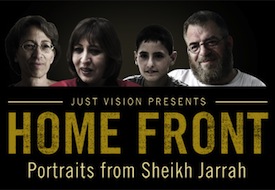 **Home Front – c.2011-2012 (32 min)
**Home Front – c.2011-2012 (32 min)
With study guide
http://www.justvision.org/homefront
A short film series chronicling the human impact of settlement expansion in East Jerusalem and nonviolent efforts to prevent the displacement of Palestinian families. Getting beyond the sensational headlines and broad generalizations that normally dominate discussions of Jerusalem, Home Front captures voices rarely heard, of those struggling to stop settlement expansion in East Jerusalem and build a future of pluralism and equality in the city.
Featuring the accounts of a Palestinian teenager forced to give up half his home to Israeli settlers, an American-born Israeli mother who gets drawn into the demonstrations after her children’s arrest, a Palestinian community organizer who brings local women to the forefront of the struggle, and a veteran of the Israeli army who becomes one of the campaign’s leaders, Home Front chronicles the resolve of a neighborhood, and the support it receives from the most unexpected of places.
Watch at the film’s website: http://www.justvision.org/homefront
See supplemental information from +972 Magazine:
https://972mag.com/sheikh%20jarrah/
Just Vision Discussion Guide for Home Front (20 pp)Includes: Statement From the filmmakers, In the Heart oF Jerusalem, Preparing for the Discussion, Discussion Questions, Module 1: Mohammed El Kurd, Module 2: Terry Benninga, Module 3: Amal Qassem Module 4: Gil Gutglick, Support Materials, Frequently Asked Questions, Get Involved and Glossary.
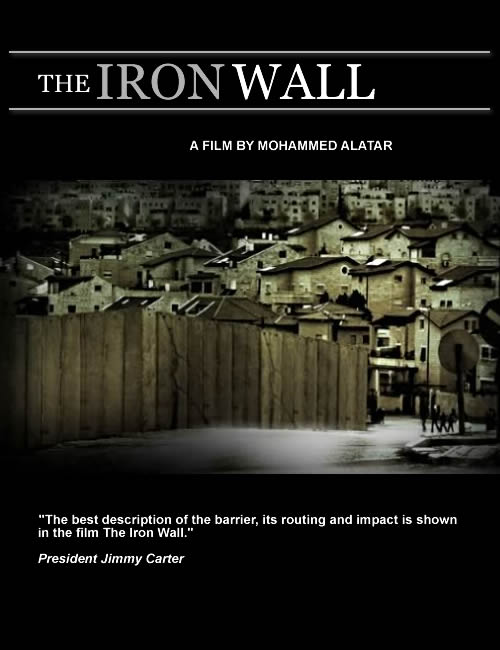 The Iron Wall – 2006 (52 min)
The Iron Wall – 2006 (52 min)
Available online
Key overview documentary by Mohammed Alatar. Shows the systematic Israeli strategy of stealing land and water resources and breaking up Palestinian communities with the wall. Also focus on settler violence in Hebron, with interviews with Palestinians and Israeli soldiers. “The best description of the barrier, its routing and impact is shown in the film The Iron Wall” President Jimmy Carter. View online. Interviews with Alatar also on YouTube.
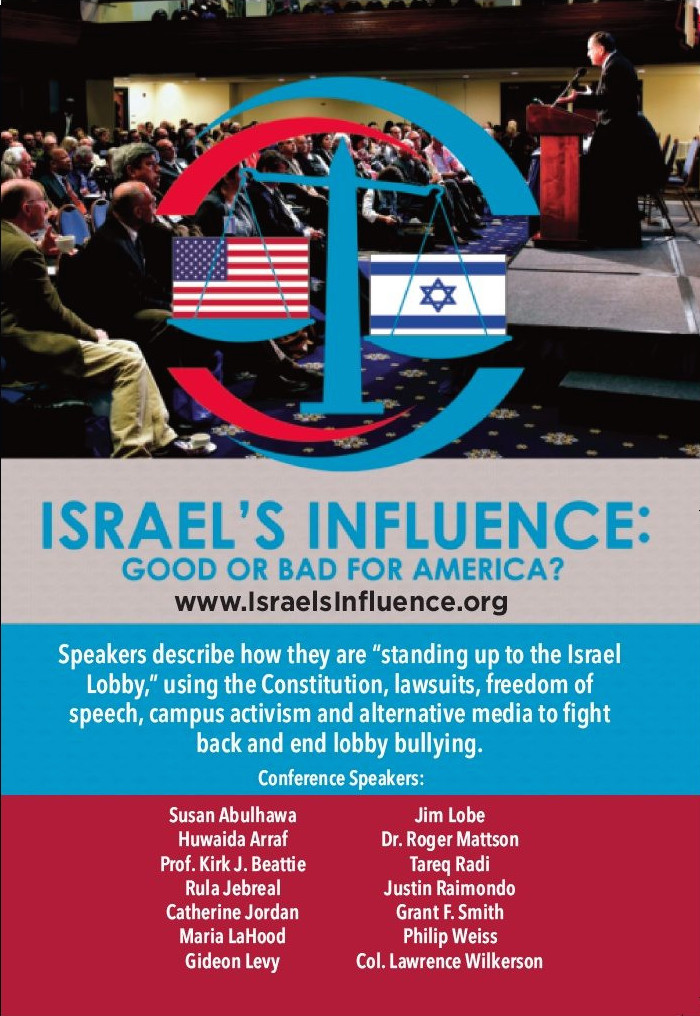 Israel’s Influence: Good or Bad for America?
Israel’s Influence: Good or Bad for America?
www.IsraelsInfluence.org
Speakers from the conference of this name, presented by Washington Report on Middle East Affairs, analyze the enormous impact of Israel’s influence on Congress, federal government agencies and other major American institutions. Includes: Susan Abulahawa, Huwaida Arraf, Prof. Kirk Beattie, Rula Jebreal, Catherine Jordan, Maria LaHood, Gideon Levy, Jim Lobe, Dr. Roger Mattson, Tareq Radi, Justin Raimondo, Grant F. Smith, Philip Weiss, Col. Lawrence Wilkerson
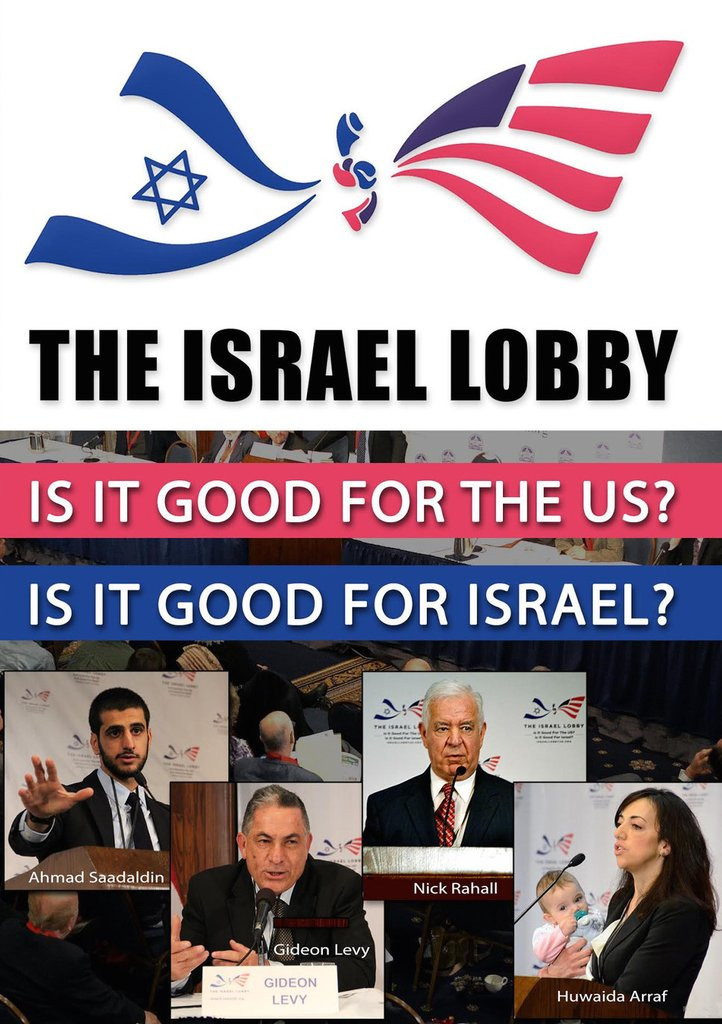 The Israel Lobby: Is it good for the US? Is it good for Israel? – 2015
The Israel Lobby: Is it good for the US? Is it good for Israel? – 2015
http://israellobbyus.org/
This unprecedented gathering focused on the Israel lobby in America. How big is it? How fast has it grown? How interconnected are the organizations and individuals? How much revenue does it raise and where does the money go? What are the common objectives of the lobby? What laws apply to lobbying to benefit a foreign government and are they vigorously enforced? Do coordinated campaign contributions cause American policymakers to act more on behalf of Israel than the United States? What fallacies underlie the assertions that U.S. and Israeli interests are the same? What are the Israel lobby’s public and private, short-and-medium-term policy objectives? And what can Americans who do not believe pro-Israel slogans, activities and policy objectives do?
See the conference in 27 segments/videos in this Youtube playlist:
https://www.youtube.com/playlist?list=PLqnzBdOyKbnZ3tc6xFu6FEAMPRcdSEtyW
 Israel vs Israel – 2010 (58 min)
Israel vs Israel – 2010 (58 min)
http://israelvsisraelmovie.com/
This documentary is about Jewish peace activists who in both words and actions take a stand again 40 years of occupation and illegal settlements, and who face skepticism and criticism from their fellow Israeli citizens. A rabbi, a soldier, a grandmother and an anarchist – four very different Israelis whom share a common goal: to achieve peace in the Middle East and end the Israeli occupation of the Palestinian Territories. Undeterred, they promote a peaceful solution to the Israeli-Palestinian conflict in order to improve the lives of Palestinians and their fellow countrymen alike.
Using in depth interviews and dynamic footage to narrate their inspiring stories, Israel vs. Israel provides a unique perspective on the struggle to find a peaceful solution of this decades-long conflict. A critically acclaimed film that has won awards as several film festivals around the world.
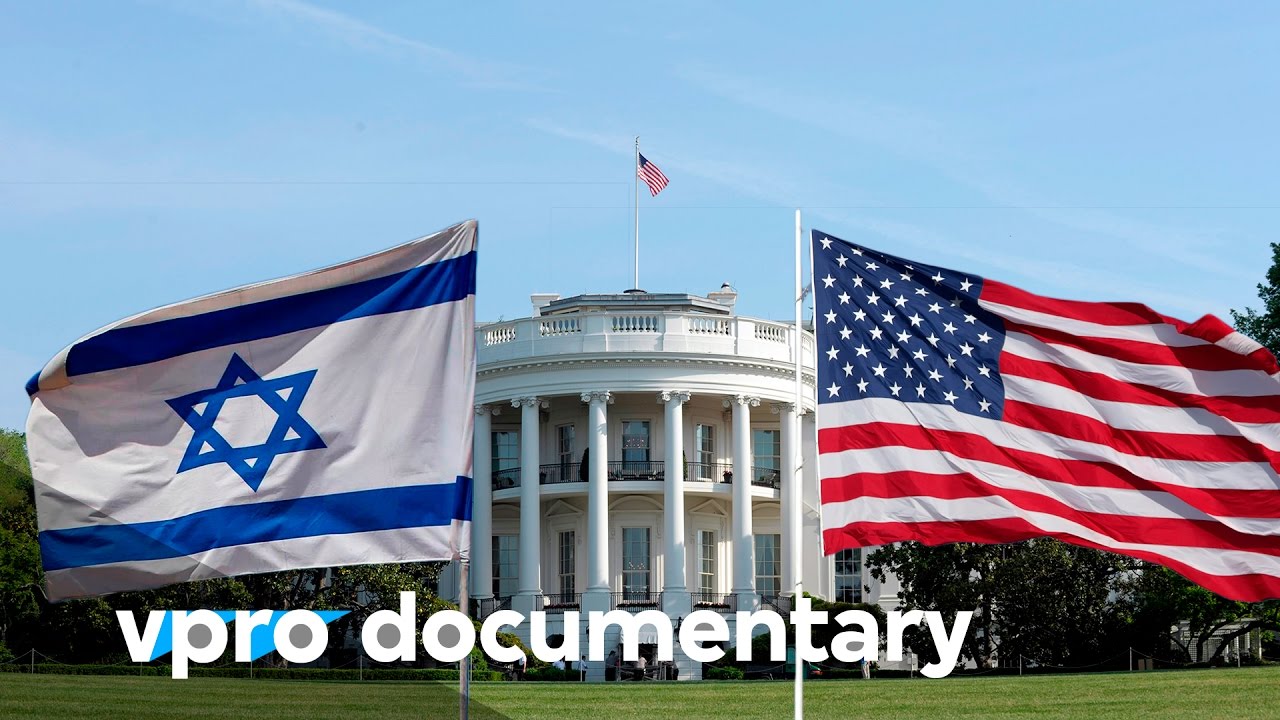 The Israel Lobby in the US – 2007 (50 min)
The Israel Lobby in the US – 2007 (50 min)
Watch it on Youtube: https://www.youtube.com/watch?v=N294FMDok98
For many years now the American foreign policy has been characterised by the strong tie between the United States and Israel. Does the United States in fact keep Israel on its feet? And how long will it continue to do so? In 2006 the American political scientists John Mearsheimer and Steve Walt published the controversial article ‘The Israel Lobby and US foreign policy’. In it they state that it is not, or no longer, expedient for the US to support and protect present-day Israel.
The documentary sheds light on both parties involved in the discussion: those who wish to maintain the strong tie between the US and Israel, and those who were critical of it and not infrequently became ‘victims’ of the lobby. The question arises to what extend the pro-Israel lobby ultimately determines the military and political importance of Israel itself.
With political scientist John Mearsheimer, neocon Richard Perle, lobby organization AIPAC, televangelist John Hagee, historian Tony Judt, Human Rights Watch director Kenneth Roth, colonel Lawrence Wilkerson, Democrat Earl Hilliard, Israeli peace negotiator Daniel Levy and investigative journalist Michael Massing.
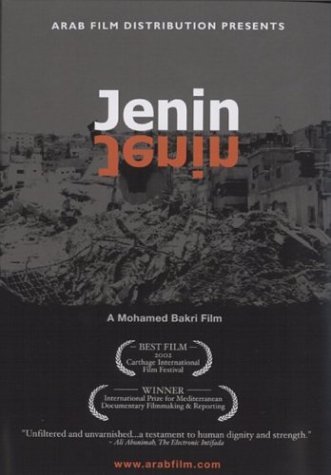 ★ Jenin, Jenin – 2003 (54 min)
★ Jenin, Jenin – 2003 (54 min)
By Palestinians
Available online
Directed by prominent Arab actor Mohammed Bakri Jenin, Jenin is a film intended to reveal what Bakri calls the Palestinian truth about the Jenin Massacre of 2002. Violent clashes occurred between the Israeli army and Palestinian civilians living in the Jenin refugee camp in the West Bank during the April of that year with allegations of terrorism being thrown from each side. The film follows little to no narrative, the 54-minute-long documentary being made up of a series of first-hand accounts of the violence. This rawness of concept and execution however is a powerful choice on Bakri’s part and the Shoah-esque simplicity of the documentary is a testament to the power of the testimonies it presents.
Jerusalem: A Rock and a Hard Place – 2019 (49 min)
Watch it online: https://www.youtube.com/watch?v=WnhlubuhC5E
A Rock And A Hard Place, a remarkable new two-part documentary special from Al Jazeera English, goes behind the scenes with residents from each of the three monolithic faiths who share one of the world’s most extraordinary cities: Jerusalem.
Here, Israeli Jews and Palestinian Muslims and Christians exist in close geographical proximity and are bound in many ways by a common history.
But as these films reveal, they are also worlds apart.
The stark, every-day challenges of life in a city shaped by 70 years of Israeli occupation – with its oppressive discrimination, security walls and endless petty restrictions – aren’t always fully understood by outsiders. To followers of different faiths, Jerusalem is a sacred and spiritual place, to many tourists it’s most famous for its culturally significant monuments, but to those who live here its status is much more complex.
These two insightful episodes go beyond some of the common misconceptions, tracing the roots of the occupation and exploring the relationship that Jerusalem’s different communities have with their city and with each other.
For Omar Harami, a young Palestinian Christian, and a lead character in the film, the consequences ofJerusalem’s divisions are too often ignored. “This is an apartheid in the 21st century and the world is silent,”he says. “Israel builds walls to hide the [settler only roads] highway, so it becomes an invisible part. WePalestinians in East Jerusalem are invisible”.
Others, including some surprising voices from across the divided community, explain how the Zionist project to establish a Jewish homeland in the territory continues to reinforce inequality and prejudice in Jerusalem today.
Dr. Meir Margalit is a former soldier and settler turned human rights activist, who researches the history of the Jewish community. “Forty percent of the city’s residents are not citizens of the state, “he says. “Theydon’t have the right to be elected. More importantly, they can lose their right to live in their city. “
Sahar Vardi, a young Israeli woman who refuses to serve in the armed forces, also condemns the divisions.“The education system, media, everything around us is by definition defined by fear,” she says.
The film also features interviews with UN Special Coordinator Nickolay Mladenov and South Africa’sambassador to Palestine talking about their experiences in one of the most renowned cities.
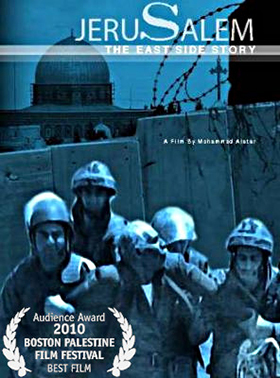 Jerusalem: The East Side Story – 2007 (57 min)
Jerusalem: The East Side Story – 2007 (57 min)
Available online
Second major film by Mohammed Alatar. Shows the devastating impact of the Israeli annexation on the old city and its peoples, highlighting Israel’s racist demographic policies. Riveting interviews with former and present inhabitants of Jerusalem. Israeli director Yotam Feldman discusses his new film ‘The Lab’, about the Israeli arms industry: how Palestinians are used as ‘guinea pigs’ and how attacks on Gaza are used to showcase Israeli arms and methods.
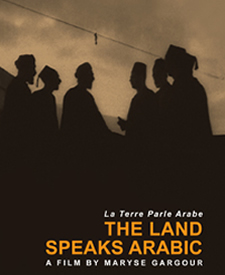 The Land Speaks Arabic – 2007 (60 min)
The Land Speaks Arabic – 2007 (60 min)
Available online
Documentary showing the late 19th century birth of Zionism—and its repercussions for Palestinians in the C20—with original source documents, rare archival footage, testimonies of witnesses and interviews with historians. Shows that the expulsion of the indigenous Arab population from Palestine was far from an accidental result of the 1948 war. This award-winning film shines a spotlight on the ethnic cleansing of Palestine by the Zionist movement. On DVD 60 mins, narrated by Nur Masalha. Brings rarely seen footage of Palestine before 1948 juxtaposed with historical research, eyewitness accounts, stunning choreography, moving testimonials, and historical documents.
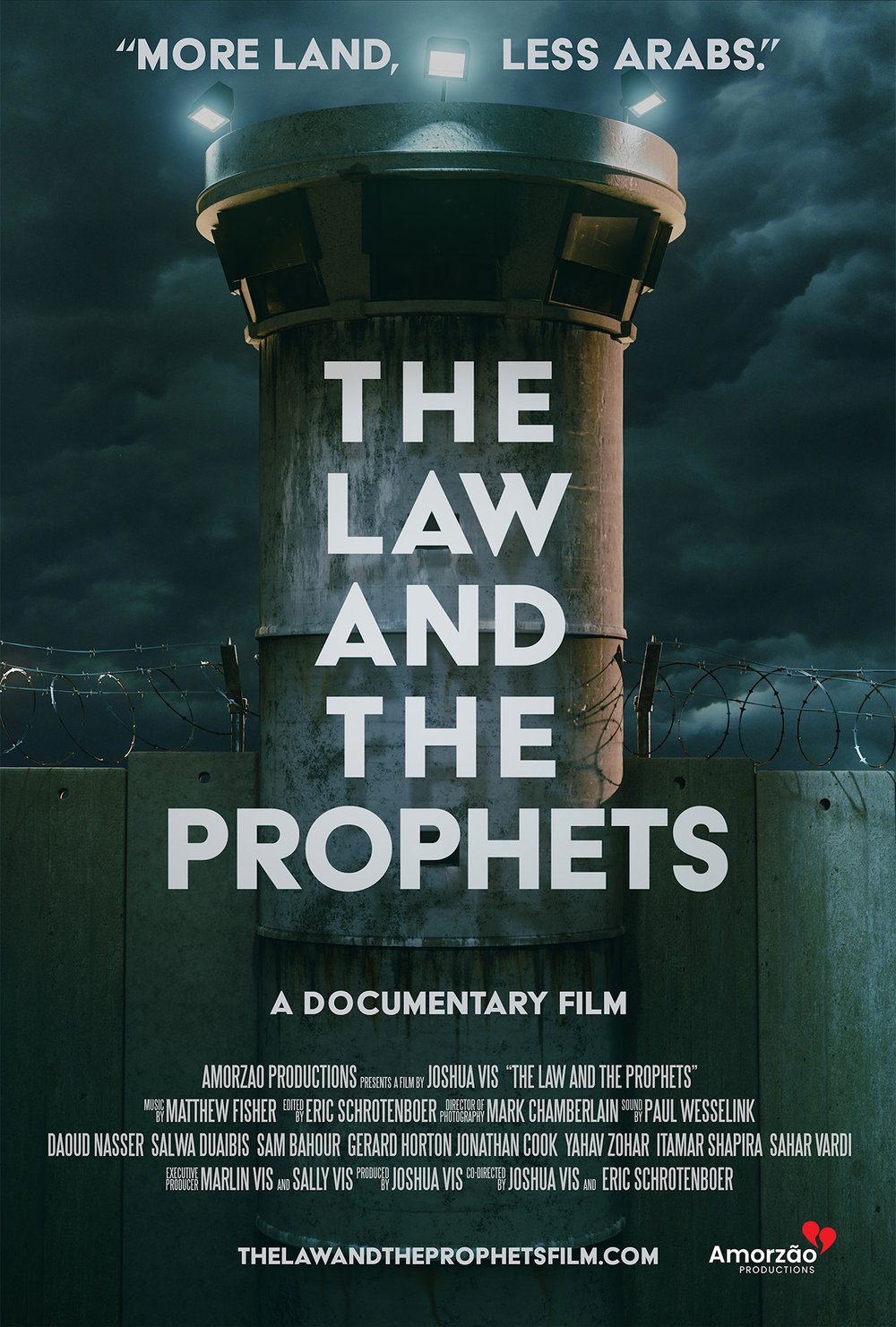 The Law and the Prophets – 2022
The Law and the Prophets – 2022
https://www.thelawandtheprophetsfilm.com
Since June 1967, Israel has controlled, in one way or another, the lives of the Palestinians living in the West Bank and East Jerusalem. Over the course of fifty years, this control has become more sophisticated, more systematic, and harder to recognize.
The Law and the Prophets is a feature documentary that amplifies the voices of the brave, determined individuals who are trying to expose the destructive, unjust, and sometimes invisible ways in which Israel exploits and oppresses Palestinians.
—-
In Israel, East Jerusalem, and the West Bank, the law is whatever Israel deems to be in the best interest of Jewish Israelis and to the detriment of Palestinians. Israel violates the civil and human rights of Palestinians as a matter of standard, accepted policy. However, there are brave, determined individuals who are trying to expose the destructive, unjust, and sometimes invisible ways in which Israel exploits and oppresses Palestinians. The Law and the Prophets explains the mechanisms of control that Israel deploys to subjugate Palestinians. These mechanisms, some violent and some nonviolent, have been perfected through decades of civil and military rule of Palestinians both within Israel, and in East Jerusalem and the West Bank.
“‘The Law and the Prophets’ shines a bright light on Israel’s systematic dispossession, dehumanization, and denial of rights to Palestinians and underscores the emptiness of talk of “peace” that doesn’t prioritize stopping these abuses and ending Israeli impunity.”
— Lara Friedman, Executive Director of Foundation for Middle East Peace (FMEP)
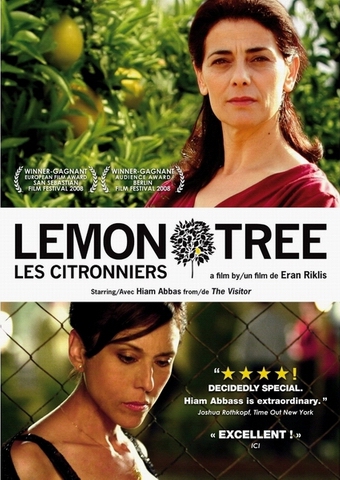 Lemon Tree – 2008 (1 hr, 48 min)
Lemon Tree – 2008 (1 hr, 48 min)
A Palestinian widow, who lives on the border between Israel and the West Bank, is suddenly forced to fight for her lemon grove when the Israeli Defense Minister moves to a house next door. The Israeli Secret Service regards the grove a threat to the Minister and his wife, and obtains permits to uproot the widow’s lemon trees. Although drenched in symbolism, the film is actually based on true events. A beautifully shot and engrossing film, Lemon Tree serves as a modern parable to the conflict in the Middle East.
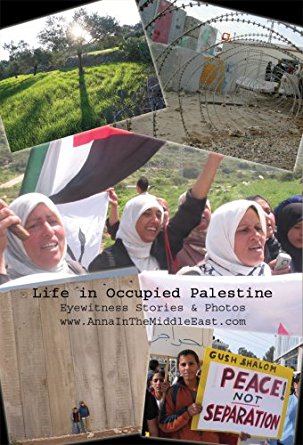 Life in Occupied Palestine – 1997 (1 hr, 6 min)
Life in Occupied Palestine – 1997 (1 hr, 6 min)
Available online
In Life in Occupied Palestine, Anna Baltzer, a graduate of Columbia University and the Jewish-American granddaughter of Holocaust refugees, documents her experience as a volunteer with the International Women’s Peace Service in the West Bank. Baltzer provides a straightforward account of the Israeli-Palestinian conflict, while chronicling the almost unbearable living conditions of Palestinians under the Occupation. An accessible introduction to a difficult subject for American students.
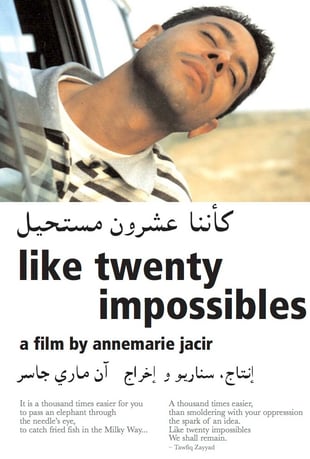 ★ Like Twenty Impossibles – 2003 (17 min)
★ Like Twenty Impossibles – 2003 (17 min)
By Palestinians
Available online
A momentous film in Palestinian terms for a number of reasons. It was the first ever Palestinian short film to be shown at the Cannes International Film Festival, with its director, Annemarie Jacir, being the first female Palestinian film director to walk the red carpet. It has won over 15 awards and is hailed as the seminal work of its critically-acclaimed director. The film tracks the journey of a fictional Palestinian film crew as they attempt to gather footage from across the Territories. Juxtaposing shots depicting the serenity of the Palestinian landscape with innumerable examples of military presence Like Twenty Impossibles gets to the very core of the harsh, and very mundane, reality of Occupation.
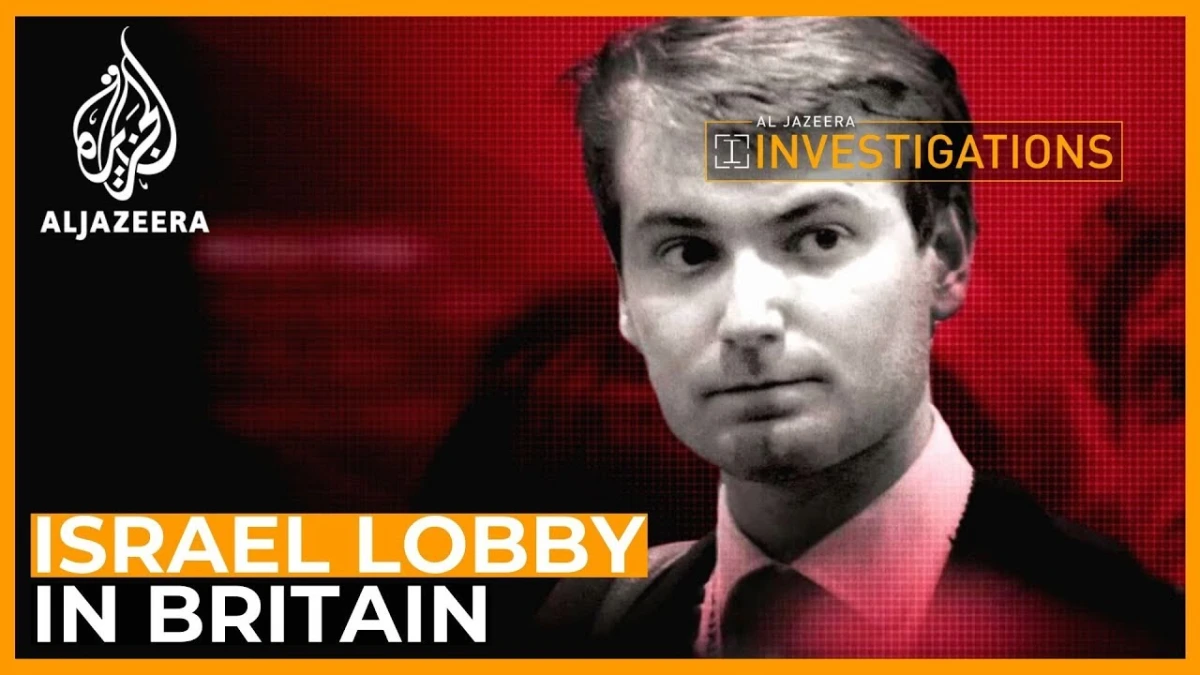 The Lobby – 2017
The Lobby – 2017
A four-part series by Al Jazeera, 26 min for each segment
Al Jazeera Investigations exposes how the Israel lobby penetrates the many different levels of British democracy.
Part 1: Young Friends of Israel (26 min)
In the first of a four-part series, Al Jazeera goes undercover inside the Israel Lobby in Britain. We expose a campaign to infiltrate and influence youth groups, including the National Union of Students, whose president faces a smear campaign coordinated by her own deputy and supported by the Israel Embassy.
https://www.aljazeera.com/program/investigations/2017/1/10/the-lobby-young-friends-of-israel-part-1/
Part 2: The Training Session (26 min)
In part two of The Lobby, our undercover reporter joins a delegation from the Israeli Embassy at last year’s Labour Party Conference. The programme reveals how accusations of anti-Semitism were made against key Labour Party members – and how a former official at the Israeli Embassy was upset when her background was revealed.
https://www.aljazeera.com/program/investigations/2017/1/11/the-lobby-the-training-session-part-2
Part 3: An Anti-Semitic Trope (26 min)
In part three of The Lobby, our undercover reporter travels to the Labour Party Conference, revealing how accusations of anti-Semitism by group within Labour targeted Israel critics and saw some investigated.
https://www.aljazeera.com/program/investigations/2017/1/13/the-lobby-an-anti-semitic-trope-part-3
Part 4: The Takedown (26 min)
In part four of The Lobby, the senior political officer at the Israeli Embassy in London discusses a potential plot to ‘take down’ British politicians – including a Minster of State at the Foreign office who supports Palestinian civil rights.
https://www.aljazeera.com/program/investigations/2017/1/14/the-lobby-the-takedown-part-4
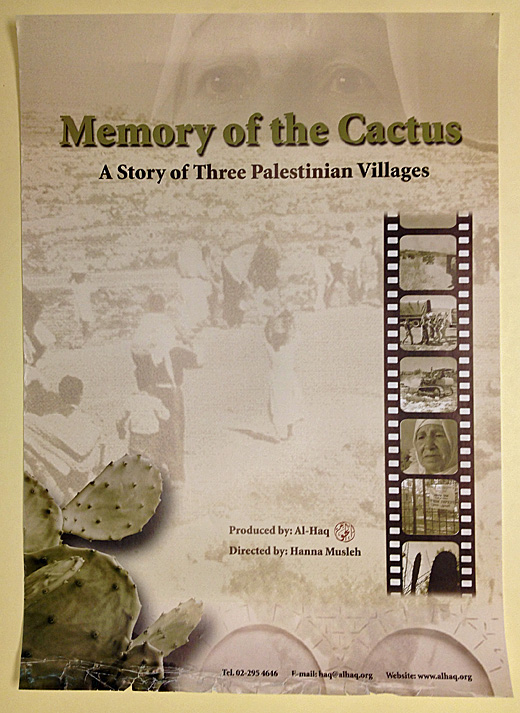 Memory of the Cactus (42 min)
Memory of the Cactus (42 min)
Available online
A 42-minute documentary film that combines the cactus and the memories it stands for. The film addresses the story of the destruction of the Palestinian villages of Latroun in the Occupied West Bank and the forcible transfer of their civilian population in 1967. Over 40 years later, the Israeli occupation continues, and villagers remain displaced.
The film follows two separate but parallel journeys. Aisha Um Najeh takes us down the painful road that Palestinians have been forcefully pushed down, separating them in time and place from the land they nurtured; while Israelis walk freely through that land, enjoying its fruits. The stems of the cactus, however, take a few of them to discover the reality of the crime committed.
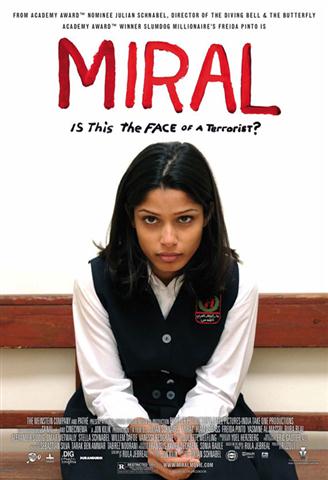 Miral – 2010 (1 hr, 43 min)
Miral – 2010 (1 hr, 43 min)
Available online
Based on the novel by Rula Jebreal. In 1948, a woman named Hind Husseini (Hiam Abbass) transforms her father’s home into an orphanage and school for Palestinian children, naming it the Dar al-Tifel Institute. Many years later, a teenager named Miral (Freida Pinto), who has grown up immersed in the institute’s peaceful ways, goes to a refugee camp as a teacher. When she falls in love with a zealous political activist, Miral must choose between violence and the peaceful path that her mentor, Mama Hind, taught her.
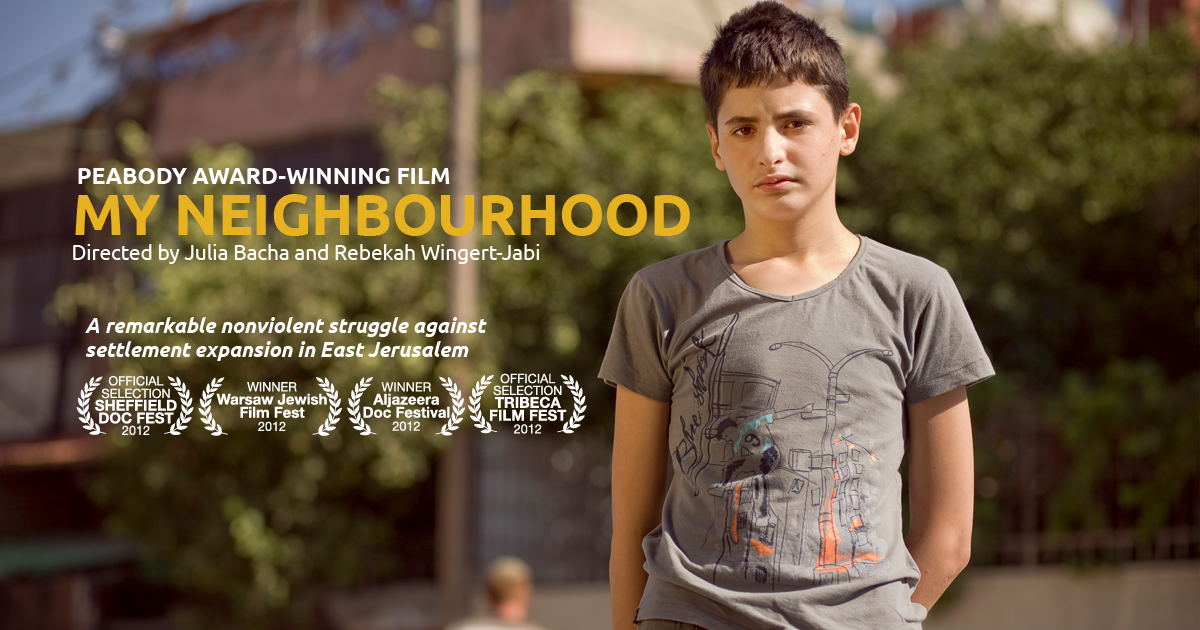 **My Neighbourhood – 2012 (25 min)
**My Neighbourhood – 2012 (25 min)
With study guide
http://www.justvision.org/myneighbourhood
Mohammed El Kurd is a Palestinian boy growing up in the neighbourhood of Sheikh Jarrah in the heart of East Jerusalem. When Mohammed turns 11, his family is forced to give up part of their home to Israeli settlers, who are leading a campaign of court-sanctioned evictions to guarantee Jewish control of the area.
Shortly after their displacement, Mohammed’s family and other residents begin holding unarmed protests against the evictions, determined not to lose their homes for good. In a surprising turn, they are quickly joined by scores of Israeli supporters who are horrified to see what is being done in their name. Among them is Jewish West Jerusalem resident Zvi Benninga and his sister Sara, who develop a strong relationship with Mohammed and his family as they take on a leading role in organizing the protests.
Through their personal stories, My Neighbourhood goes beyond the sensational headlines that normally dominate discussions of Jerusalem and captures voices rarely heard, of those striving for a future of equality and pluralism in the city.
My Neighbourhood follows Mohammed as he comes of age in the midst of unrelenting tension and remarkable cooperation in his backyard. Highlighting Mohammed’s own reactions to the highly volatile situation, reflections from family members and other evicted residents, accounts of Israeli protesters and interviews with Israeli settlers, the film chronicles the resolve of a neighbourhood and the support it receives from the most unexpected of places.
Purchase the DVD: http://www.justvision.org/store
Watch in online: http://www.justvision.org/myneighbourhood/watch
Just Vision Discussion Guide for My Neighbourhood (36 pp)Includes: Statement from the Filmmakers, In the Heart of Jerusalem, Who’s Who, Preparing for the Discussion, Pre-screening discussion, Discussion Questions, Media Analysis, Nonviolence and Movement Building, Israeli Participation, Israeli Settler Presence, Israeli Government, Judicial and Police Involvement and Response, Approaches to Change and more.
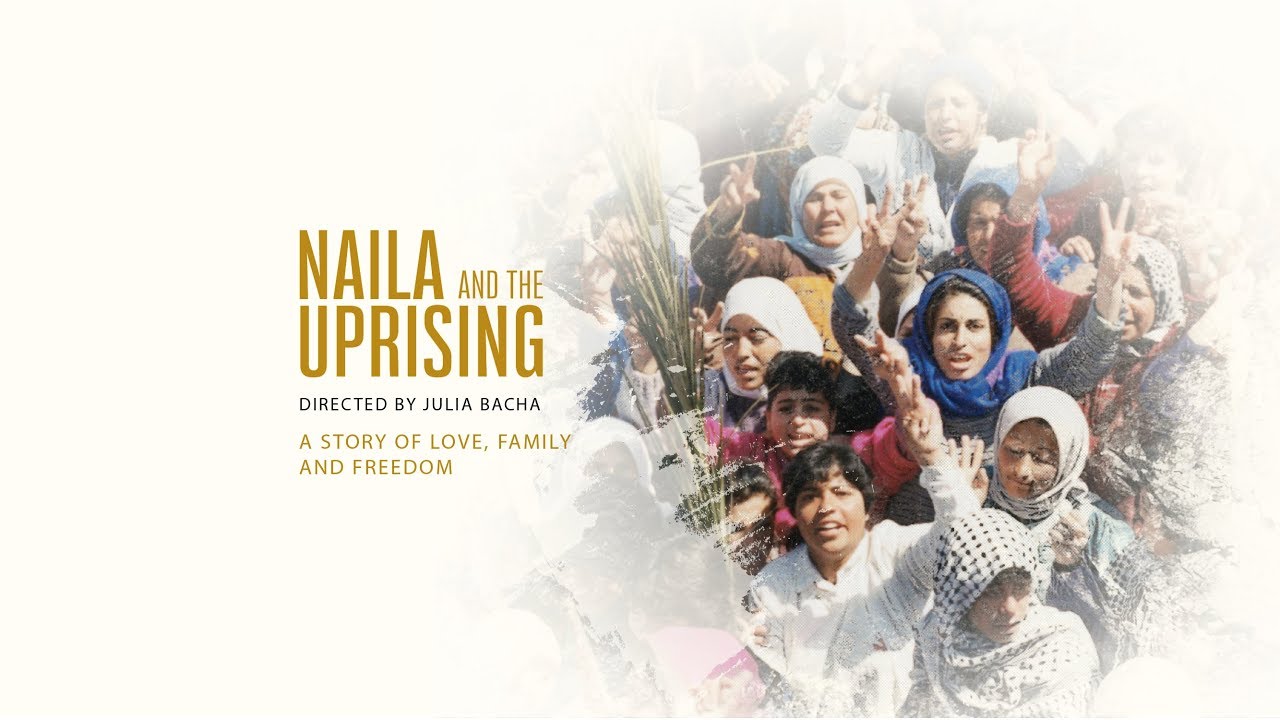 Naila and the Uprising – 2017 (1 hr, 16 min)
Naila and the Uprising – 2017 (1 hr, 16 min)
https://justvision.org/nailaandtheuprising
See the FAQ page for this film: https://justvision.org/nailaandtheuprising/about/faq
See the trailer: https://www.youtube.com/watch?v=zotlaEEnSZw&t=1s
Available for free at Plex (includes advertisement)
https://watch.plex.tv/movie/naila-and-the-uprising
Also available to rent or purchase:
Youtube: https://www.youtube.com/watch?v=thuJN6v-Zdw
Google Play: https://play.google.com/store/movies/details?id=sQffP-VoUzw.P
Included in the PBS series: Women, War & Peace
When a nation-wide uprising breaks out in the Occupied Palestinian Territories, a young woman in Gaza must make a choice between love, family, and freedom. Undaunted, she embraces all three, joining a clandestine network of women in a movement that forces the world to recognize the Palestinian right to self-determination for the first time. Naila and the Uprising chronicles the remarkable journey of Naila Ayesh and a fierce community of women at the frontlines, whose stories weave through the most vibrant, nonviolent mobilization in Palestinian history – the First Intifada in the late 1980s.
Using evocative animation, intimate interviews, and exclusive archival footage, this film brings out of anonymity the courageous women activists who have remained on the margins of history — until now. While most images of the First Intifada paint an incomplete picture of stone-throwing young men front and center, this film tells the story that history overlooked – of an unbending, nonviolent women’s movement at the head of Palestine’s struggle for freedom.
While the First Intifada provides the backdrop for Naila and the Uprising, its lessons transcend that particular time and place. Through the experience of countless women engaged at all levels of society, we learn what is possible when women take the lead in struggles for rights and justice — from a movement’s inception to peace talks — and what we lose when they are stripped of their roles. Echoing struggles around the world, we also witness the tremendous power of nonviolent organizing: women’s committees, drawing on all the hallmarks of civil resistance, were able to mobilize hundreds of thousands through massive street rallies, mobile health clinics, underground schools and concerted boycott campaigns, sustaining the uprising while generating indigenous self-sufficiency. In Naila and the Uprising we see how women-led civil resistance can stir the masses, put pressure on power-holders, and affect real structural change.
The film was directed by award-winning filmmaker and Just Vision’s Creative Director, Julia Bacha (director of Budrus and co-director of My Neighbourhood) and produced by Just Vision’s Education and Public Engagement Manager, Rula Salameh and Rebekah Wingert-Jabi (co-director of My Neighbourhood). Executive Producers include Just Vision’s Executive Director, Suhad Babaa, along with Abigail E. Disney, Gini Reticker, Deirdre Hegarty, Joan Platt and the Women Donors Network.
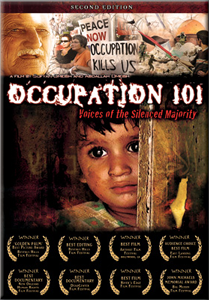 **Occupation 101: Voices of the Silenced Majority – 2006 (1 hr, 30 min)
**Occupation 101: Voices of the Silenced Majority – 2006 (1 hr, 30 min)
With study guide
http://www.occupation101.com/
A thought-provoking and gripping film on the current and historical root causes of the Israeli-Palestinian conflict. Unlike any other film ever produced on Israel/Palestine, Occupation 101 presents a comprehensive analysis of the facts and hidden truths surrounding the never ending controversy and dispels many of its long-perceived myths and misconceptions.
The film also details life under Israeli military rule, the role of the United States in the conflict, and the major obstacles that stand in the way of a lasting and viable peace. The roots of the conflict are explained through first-hand on-the-ground experiences from leading Middle East scholars, peace activists, journalists, religious leaders and humanitarian workers whose voices have too often been suppressed in American media outlets.
The film covers a wide range of topics, which include: the first wave of Jewish immigration from Europe in the 1880’s, the 1920 tensions, the 1948 war, the 1967 war, the first Intifada of 1987, the Oslo Peace Process, Settlement expansion, the role of the United States Government, the second Intifada of 2000, the separation barrier and the Israeli withdrawal from Gaza, as well as many heart wrenching testimonials from victims of this tragedy.
Occupation 101 features a leading list of some of the most credible Middle East scholars, historians, peace activists, journalists, and humanitarian workers, including Bishop Allen Bartlett, Jr, Phyllis Bennis, Father Drew Christiansen, Noam chomsky, Cindy and Craig Corrie, Richard Falk, Amira Hass, Jeff Halper, Rashid Khalidi, Rabbi Michael Lerner, Ilan Pappe, and more.
“Reflects mastery of the filmmaking arts…storytelling and humanity.” International Beverly Hills Film Festival
“If a picture is worth a thousand words, then Occupation 101 is worth a thousand books!” INFOCUS
“Not a false note in the entire film.” Richard Falk, Scholar of International Law
One of the best documentaries! Los Angeles Journal
Powerful! NEOFLIX
“One of the most important films of the century.” Amazon Reviews
“Illuminating clarion call for truth in media and human rights justice.” Move Magazine International
Review on Middle East Monitor
Review on Electronic Intifada
Purchase the second edition of the DVD at the website: http://www.occupation101.com/purchase.html
The second edition includes:
Deleted Scenes (32 mins): In-depth analysis of historical accounts from time periods in the 1900s, 1940s, and 1967; International Law extended scene; Shu’fat Refugee Camp home demolition incident; Innocent civilian victims of violence; Israeli Activist Awakening; Rachel Corrie extended scene, and more.
Bonus Footage (1 hour): Historical footage of the conflict from (British) Pathe News Archives; Testimonials from Bethlehem University; Nonviolent activism by International Solidarity Movement members; Raw footage from Jenin Refugee Camp Destruction sight; CRS Medical Director testimony; and more.
DVD is available for purchase at Amazon and other online vendors.
Stream the film at the official website in seven continuous, HD segments:
http://www.occupation101.tv/
Full length film also on Youtube:
https://www.youtube.com/watch?v=kNlGbjPOmCU
Also available for viewing online here:
https://freedocumentaries.org/documentary/occupation-101-voices-of-the-silenced-majority
Palestine Teaching Trunk Discussion Guide for Occupation 101 (5 pp)
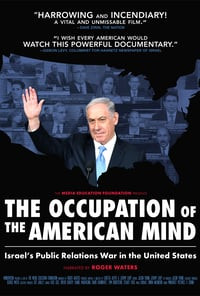 The Occupation of the American Mind – 2016 (1 hr, 15 min)
The Occupation of the American Mind – 2016 (1 hr, 15 min)
http://mediaed.org/occupationmovie/
Israel’s ongoing military occupation of Palestinian territory and its repeated invasions of the Gaza strip have triggered a fierce backlash against Israeli policies virtually everywhere in the world — except the United States. The Occupation of the American Mind takes an eye-opening look at this critical exception, zeroing in on pro-Israel public relations efforts within the U.S. Narrated by Roger Waters and featuring leading observers of the Israeli–Palestinian conflict, the film explores how the Israeli government, the U.S. government, and the pro-Israel lobby have joined forces, often with very different motives, to shape American media coverage of the conflict in Israel’s favor. The Occupation of the American Mind provides a sweeping analysis of Israel’s decades-long battle for the hearts, minds, and tax dollars of the American people — a battle that has only intensified over the past few years in the face of widening international condemnation of Israel’s increasingly right-wing policies.
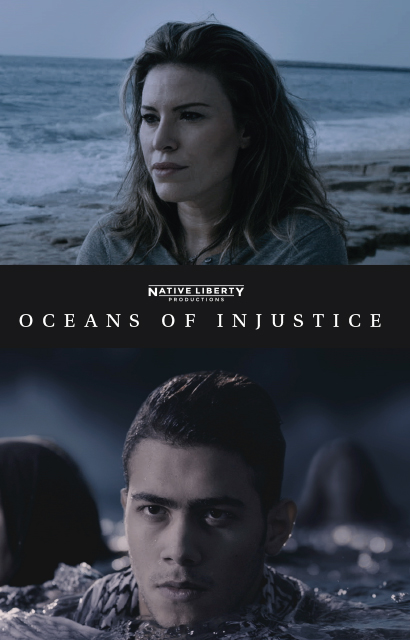 Oceans of Injustice
Oceans of Injustice
http://www.oceansofinjustice.com/
You have to visit Occupied Palestine to truly understand the oceans of injustice that have gone on for so long. But if you can’t go, then let the short 10 minute film Oceans of Injustice take you on a metaphorical journey.
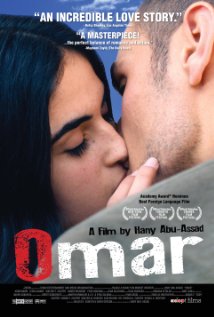 ★ Omar – 2014 (1 hr, 36 min)
★ Omar – 2014 (1 hr, 36 min)
By Palestinians
Available online
A tense, gripping thriller about betrayal, suspected and real, in the Occupied Territories. Omar (Adam Bakri) is a Palestinian baker who routinely climbs over the separation wall to meet up with his girl Nadja (Leem Lubany). By night, he’s either a freedom fighter or a terrorist-you decide-ready to risk his life to strike at the Israeli military with his childhood friends Tarek (Eyad Hourani) and Amjad (Samer Bisharat). Arrested after the killing of an Israeli soldier and tricked into an admission of guilt by association, he agrees to work as an informant. So begins a dangerous game-is he playing his Israeli handler (Waleed F. Zuaiter) or will he really betray his cause? And who can he trust on either side? Palestinian filmmaker Hany Abu-Assad (Paradise Now) has made a dynamic, action-packed drama about the insoluable moral dilemmas and tough choices facing those on the frontlines of a conflict that shows no sign of letting up.
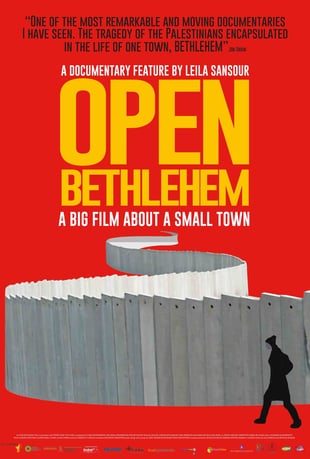 Open Bethlehem – 2015 (1 hr, 30 min)
Open Bethlehem – 2015 (1 hr, 30 min)
http://www.openbethlehem.org/
Film director Leila Sansour returns to Bethlehem to make a film about her home town, soon to be encircled by a wall. She left the city as a teenager thinking that Bethlehem was too small and provincial. She never wanted to return but this time she is making an exception. She intends her film to be a tribute to her late father, founder of Bethlehem University, and a man regarded as a hero by his town’s folk. As Bethlehem approaches ruin her decision to flee this sleepy town, taken much to her father’s regret, comes to haunt her. OPEN BETHLEHEM is a story of a homecoming to the world’s most famous little town. The film spans seven momentous years in the life of Bethlehem, revealing a city of astonishing beauty and political strife under occupation. The film draws from 700 hours of original footage and some rare archive material. In fact the making of this film has led to the creation of the largest visual archive of Bethlehem in the world and plans are currently being discussed with University College London (UCL) to turn the collection into a museum.
While telling a personal story, the film charts the creation of a campaign to compel international action to bring peace to the Middle East. As the credits roll, there is snow over Bethlehem. Leila has stayed long enough to realize that she is home for good and her battered little family car takes to the sky. Sometimes, if you want to fight for a better world, you may have to work miracles!
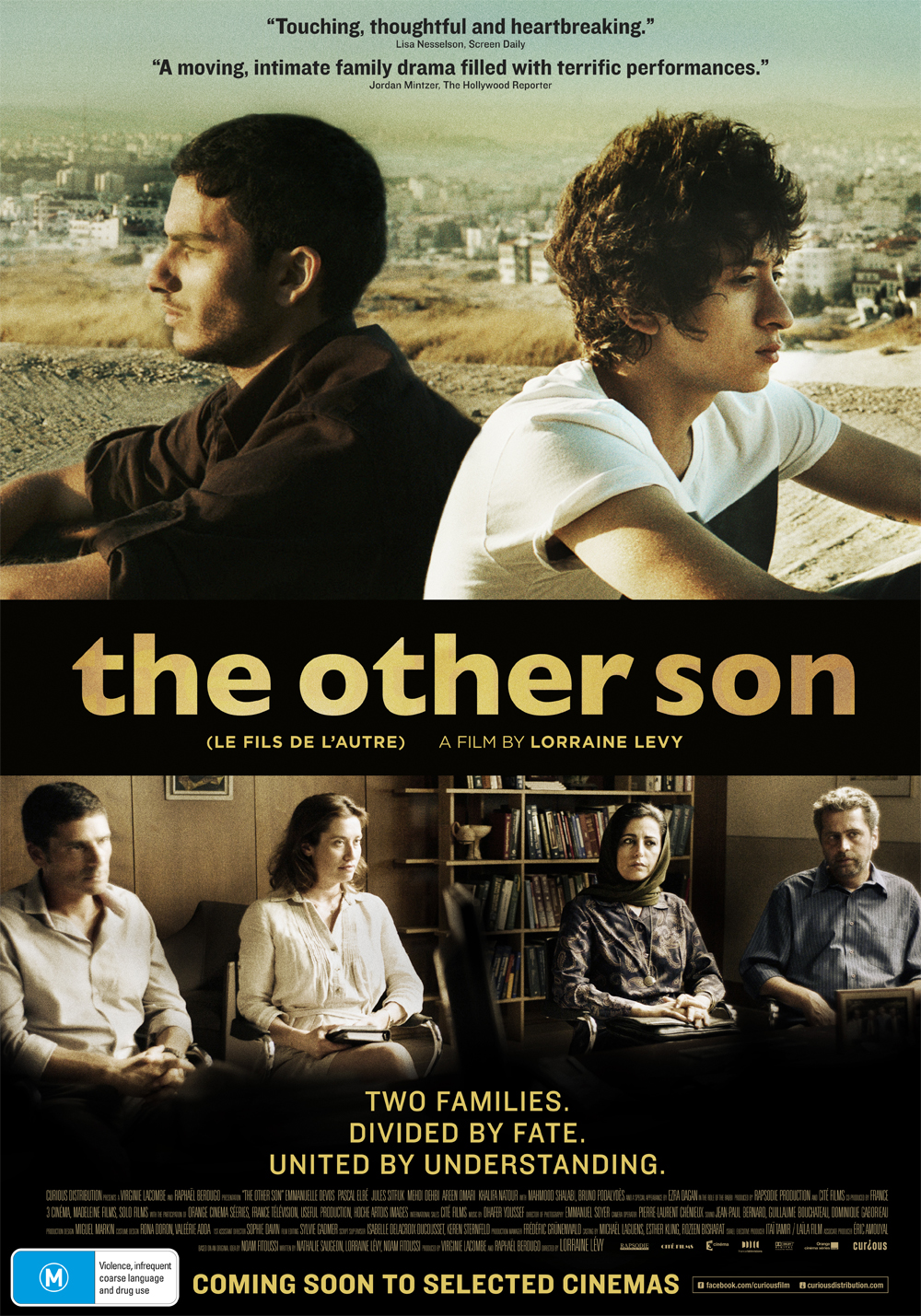 The Other Son – 2011 (1 hr, 45 min)
The Other Son – 2011 (1 hr, 45 min)
Available online
Joseph is a regular eighteen-year-old who writes folk songs and plays the guitar. He has never looked much like the other members of his family, but they have always been a tight knit clan. When he reports for his pre-induction interview prior to his army service, a blood test reveals that he is not his parents’ son. Research quickly reveals that at the time of his birth during the Gulf War, Joseph was evacuated from the hospital along with another baby and they were mixed up. While the Palestinian Joseph went home to the Silver’s to live in a comfortable suburb of Tel Aviv, the other son, Yacine, went to an Arab couple in the West Bank. What is the effect of this mistake? How do the Jewish and Palestinian sons reconcile their identities? And what do the families do now?
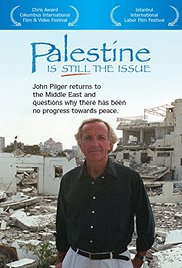 Palestine Is Still The Issue – 2003 (53 min)
Palestine Is Still The Issue – 2003 (53 min)
http://johnpilger.com/videos/palestine-is-still-the-issue
In a series of extraordinary interviews with both Palestinians and Israelis, John Pilger weaves together the issue of Palestine. Pilger first made the film ‘Palestine Is Still The Issue’ in 1977. It told how almost a million Palestinians had been forced off their land in 1948, and again in 1967. Twenty five years later, John Pilger returned to the West Bank of Jordan and Gaza, and to Israel, to ask why the Palestinians, whose right of return was affirmed by the United Nations more than half a century ago, are still caught in a terrible limbo – refugees in their own land, controlled by Israel in the longest military occupation in modern times. “If we are to speak of the great injustice here, nothing has changed,” says Pilger at the start of the film, “What has changed is that the Palestinians have fought back. Stateless and humiliated for so long, they have risen up against Israel’s huge military regime, although they themselves have no army, no tanks, no American planes and gunships or missiles. Some have committed desperate acts of terror, like suicide bombing. But, for Palestinians, the overriding, routine terror, day after day, has been the ruthless control of almost every aspect of their lives, as if they live in an open prison. This film is about the Palestinians and a group of courageous Israelis united in the oldest human struggle, to be free.”
Pilger distills the history of Palestine during the twentieth century into an easily comprehensible struggle for land – the loss of seventy-eight per cent of that belonging to Palestinians when the state of Israel was founded in 1948 and their claim to only the remaining twenty-two per cent, which had for thirty-five years been occupied by Israel.
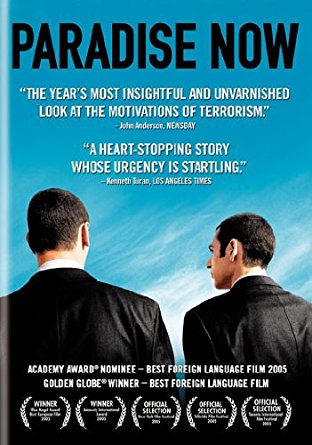 ★ Paradise Now – 2005 (1 hr, 30 min)
★ Paradise Now – 2005 (1 hr, 30 min)
By Palestinians
Available online
Paradise Now is a feature length fictional film by Israeli-born Palestinian director Hany Abu-Assad. It is the story of two Palestinian men, Said and Khaled, who have been recruited by a Palestinian organisation to carry out suicide attacks in the Israeli city of Tel Aviv. The film follows the two men, friends from childhood, through what would be their last days as they build themselves up to their deaths. The film raises politically charged questions regarding the relationship between Israel and Palestine, it questions the roles of the perpetrator and victim and assigns a very human face to the term ‘terrorist’.
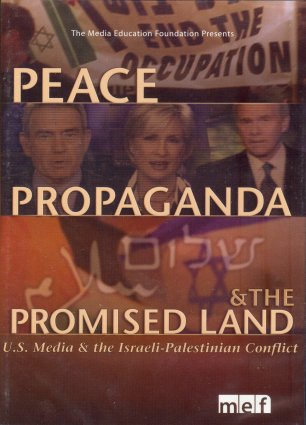 Peace, Propaganda & the Promised Land: U.S. Media & the Israeli-Palestinian Conflict – 2003 (1 hr, 20 min)
Peace, Propaganda & the Promised Land: U.S. Media & the Israeli-Palestinian Conflict – 2003 (1 hr, 20 min)
Available online
Peace, Propaganda & the Promised Land provides a striking comparison of U.S. and international media coverage of the crisis in the Middle East, zeroing in on how structural distortions in U.S. coverage have reinforced false perceptions of the Israeli-Palestinian conflict. This pivotal documentary exposes how the foreign policy interests of American political elites–oil, and a need to have a secure military base in the region, among others–work in combination with Israeli public relations strategies to exercise a powerful influence over how news from the region is reported. Through the voices of scholars, media critics, peace activists, religious figures, and Middle East experts, Peace, Propaganda & the Promised Land carefully analyzes and explains how–through the use of language, framing and context–the Israeli occupation of the West Bank and Gaza remains hidden in the news media, and Israeli colonization of the occupied terrorities appears to be a defensive move rather than an offensive one. The documentary also explores the ways that U.S. journalists, for reasons ranging from intimidation to a lack of thorough investigation, have become complicit in carrying out Israel’s PR campaign. At its core, the documentary raises questions about the ethics and role of journalism, and the relationship between media and politics.
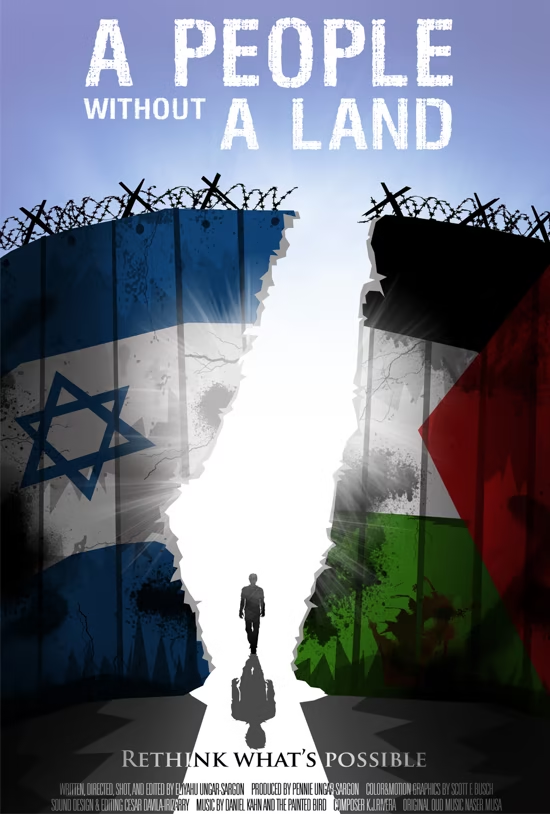 A People Without a Land – 2014 (1 hr, 15 min)
A People Without a Land – 2014 (1 hr, 15 min)
See the trailer and find links for the full film at several locations for rent or purchase: https://www.youtube.com/watch?v=hQOUQguGkhw
Exploring the notion that the only real solution to the Israeli-Palestinian conflict is a one-state solution.
Settlement expansion in Palestine is out of control – now we need to speak about the One State Solution! Is the patchwork of remaining Palestinian land now so fragmented it could never form a viable future state? This incisive film asks whether the settlers have finally destroyed any chance of anything but a single homogeneous Palestinian Jewish state.
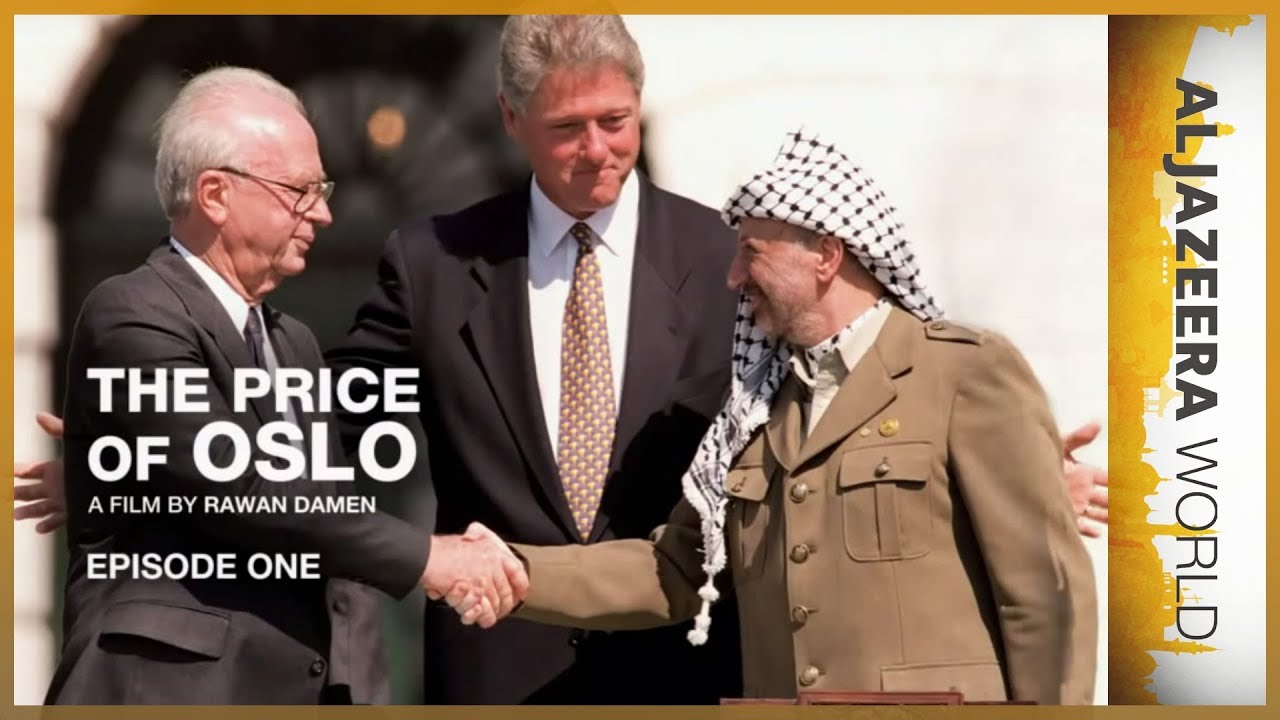 The Price of Oslo – 2013 (47 min, each part)
The Price of Oslo – 2013 (47 min, each part)
See Parts 1 and 2 at Al Jazeera’s website (scroll down the page for Part 2)
https://www.aljazeera.com/program/al-jazeera-world/2013/9/18/the-price-of-oslo
This series traces the secret road to the Oslo Accords and asks why, 20 years on, peace remains elusive.
Twenty-five years ago, after decades of conflict between Israelis and Palestinians, a prospect for peace emerged.
It was September 1993, and a handshake between Yitzhak Rabin, the then Israeli prime minister, and Yasser Arafat, the then leader of the Palestine Liberation Organization, on the lawn of the White House raised hopes that peace would finally come to the Middle East.
This two-part series traces the secret road to the Oslo Accords, telling the story of negotiations that took place in the political shadows and a search for common ground in the midst of a region in constant turmoil. At the centre of it all was an unlikely mediator: the Scandinavian country of Norway.
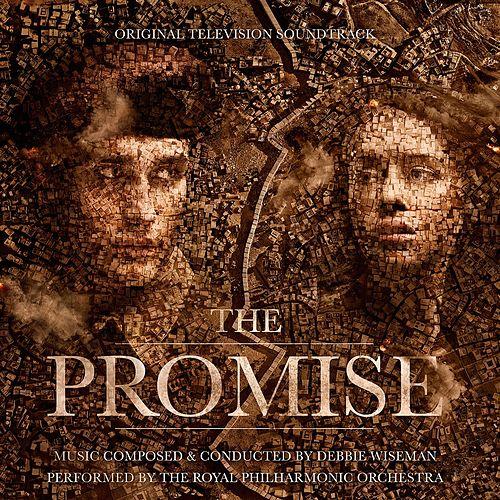 The Promise – 2011 (4 episodes, 6 hours total)
The Promise – 2011 (4 episodes, 6 hours total)
Available online
Peter Kosminky’s four-part drama was a great critical and popular success. It tells the story of the run-up to the Nakba in 1948 through the eyes of a British soldier, interwoven with the visit of his granddaughter 60 years later who tries to find the Palestinian family he befriended.
From a review on The Electronic Intifada:
Nothing is guaranteed to arouse passions and stir consciences more than a great film dramatization that shines a light on the truth of an issue in ways that earnest documentaries and studious literature often do not. So it is with The Promise, an epic series that entranced many Palestinians who had the chance to view it in the UK, along with others astonished by its forthright and honest treatment of Palestine both in the final years of the British mandate and now. As a bold and uncompromising piece of TV scheduling by Channel 4, it was outstanding. Read more
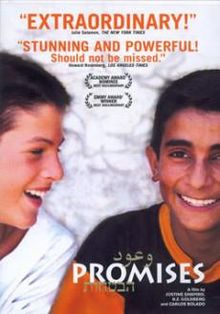 **Promises – 2001 (1 hr, 42 min)
**Promises – 2001 (1 hr, 42 min)
With study guide
http://www.promisesproject.org
A Film by BZ Goldberg, Justine Shapiro, and Carlos Bolado.
In Arabic, Hebrew, and English with English subtitles.
A beautiful and deeply moving portrait of seven Palestinian and Israeli children, Promises follows the journey of a filmmaker who meets these children in and around Jerusalem, from a Palestinian refugee camp to an Israeli settlement in the West Bank. Although they live only 20 minutes apart, these children exist in completely separate worlds, divided by physical, historical, and emotional boundaries. PROMISES explores the nature of these boundaries and tells the story of a few children who dared to cross the lines to meet their neighbors. The children of Promises offer refreshing, personal and sometimes humorous insight into the Palestinian-Israeli conflict. With remarkable balance and a compelling blend of pathos and humor, this Oscar-nominated, Emmy Award winning film moves the conflict out of politics and into the realm of the human.
Purchase the DVD for home viewing:
http://www.promisesproject.org/dist.html
Also at the link above, purchase the Educational Package from the producers of the film, for K-12 schools, colleges and universities, public libraries, religious institutions, and non-profits.
This package includes: Lesson Plans correlated to “chapters” on DVD, Classroom Activities, Reproducible Student Worksheets, Glossary, Background and historical information, Reference Guide to web sites, books and periodicals, Readings and Poems, Lesson plans can be correlated to state standards for Social Studies, History and Language-Arts.
Palestine Teaching Trunk Discussion Guide for Promises (5pp)
Includes: Introduction of the events during the period of this film,
Problems with this film, Teachers’ notes, Questions for students to answer
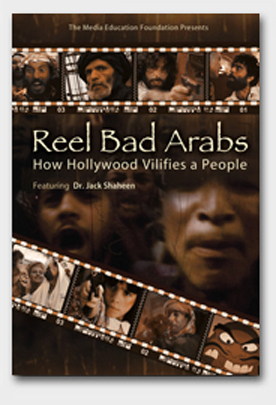 Reel Bad Arabs: How Hollywood Vilifies a People – 2006 (50 min)
Reel Bad Arabs: How Hollywood Vilifies a People – 2006 (50 min)
Available online
This groundbreaking documentary dissects a slanderous aspect of cinematic history that has run virtually unchallenged from the earliest days of silent film to today’s biggest Hollywood blockbusters. Featuring acclaimed author Dr. Jack Shaheen, the film explores a long line of degrading images of Arabs–from Bedouin bandits and submissive maidens to sinister sheikhs and gun-wielding “terrorists”–along the way offering devastating insights into the origin of these stereotypic images, their development at key points in U.S. history, and why they matter so much today. Shaheen shows how the persistence of these images over time has served to naturalize prejudicial attitudes toward Arabs and Arab culture, in the process reinforcing a narrow view of individual Arabs and the effects of specific US domestic and international policies on their lives. By inspiring critical thinking about the social, political, and basic human consequences of leaving these Hollywood caricatures unexamined, the film challenges viewers to recognize the urgent need for counternarratives that do justice to the diversity and humanity of Arab people and the reality and richness of Arab history and culture.
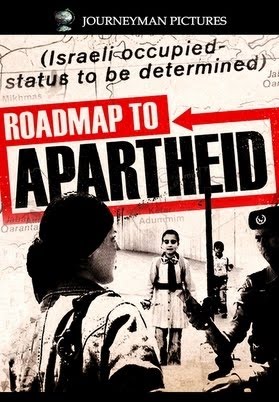 Roadmap to Apartheid – 2012 (1 hr, 35 min)
Roadmap to Apartheid – 2012 (1 hr, 35 min)
http://roadmaptoapartheid.org/
In this award-winning documentary, the first-time directors take a detailed look at the apartheid analogy commonly used to describe the Israeli-Palestinian conflict.
Narrated by Alice Walker (author of The Color Purple), Roadmap to Apartheid is as much a historical document of the rise and fall of apartheid in South Africa, as it is a film about why many Palestinians feel they are living in an apartheid system today, and why an increasing number of people around the world agree with them.
While not perfect, the apartheid analogy is a useful framework by which to educate people on the complex issues facing Israelis and Palestinians. Our film delves into those issues, comparing the many similar laws and tools used by both Israel and apartheid-era South Africa. The audience will see what life is like for Palestinians in the West Bank, Gaza Strip and inside Israel while gaining a deeper understanding of the conflict with the help of respected analysts on the subject. Combined with archival material and anecdotes from South Africans, the film forms a complete picture as to why the analogy is being used with increasing frequency and potency.
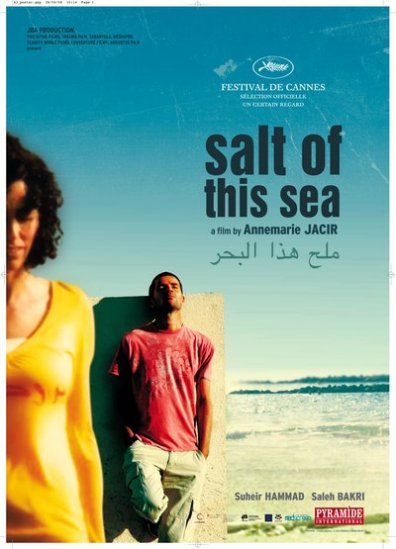 Salt of This Sea – 2008 (1 hr, 49 min)
Salt of This Sea – 2008 (1 hr, 49 min)
Available online
Ben Gurion Airport. An American passport is placed on the counter. The security agent looks up to find Soraya, a third generation refugee from Brooklyn. She is asked to step aside for a thorough security inspection. The last passenger to clear customs, Soraya is finally permitted to pass. She exits the customs hall to a sea of faces, welcome balloons, and kissing relatives — none are for her. Sixty years after her grandparent’s exile, she has returned.
Soraya, born in Brooklyn in a working class community of Palestinian refugees, discovers that her grandfather’s savings were frozen in a bank account in Jaffa when he was exiled in 1948. Stubborn, passionate and determined to reclaim what is hers, she fulfills her life-long dream of “returning” to Palestine. Once there, slowly she is taken apart by the reality around her and is forced to confront her own anger. She meets Emad, a young Palestinian whose ambition, contrary to hers, is to leave forever. Tired of the constraints that dictate their lives, they know in order to be free, they must take things into their own hands, even if it’s illegal.
Seeing through the Wall: Meeting Ourselves in Palestine and Israel – 2017 (57 min)
http://olddogdocumentaries.org/shop/seeing-through-the-wall/
Also available for rent or purchase:
Amazon Prime:
https://www.amazon.com/Seeing-Through-Wall-Anne-Macksoud/dp/B077T3Q7V4
2017 marks the 50th anniversary of the 6th Day War and the Israeli occupation of Palestine. It’s an opportunity to take stock. For Israelis and for Jews around the world, the 1948 War of Independence was a miracle—and a new beginning for a suffering people. For Palestinians, it turned out to be a catastrophe. Both narratives are authentic.
Need we choose one over the other? Israeli conductor Daniel Barenbolim said recently during a visit to the West Bank: “Jewish blood runs through my veins, but my heart beats for the Palestinian cause.”
Director Anne Macksoud‘s film offers the chance to re-visit these narratives through the eyes of a group of Americans who traveled to Israel and Palestine in 2016 seeking to understand what life is like for Palestinians living in the Occupied Territories and in East Jerusalem.
Rabbi Dov Taylor put together a 12-day tour of Israel and Palestine for this group. As Rabbi Taylor put it, “I wanted Americans, and American Jews in particular, to have the opportunity to meet and get to know some Palestinians as human beings, just like themselves, with the same hopes and fears and dreams.”
The journey became an intense encounter not only with the people they met, but also with their own preconceptions, an experience that for many of the travelers was transformative.
Seeing through the Wall invites watchers to question their own assumptions and prejudices. To witness life in occupied Palestine. To meet Palestinians who are Israeli citizens. To meet Jewish and Palestinian activists.
One viewer recently wrote: “A brilliant, sensitive and even-handed look at an intolerable situation. It can’t fail to move audiences wherever it’s shown.”
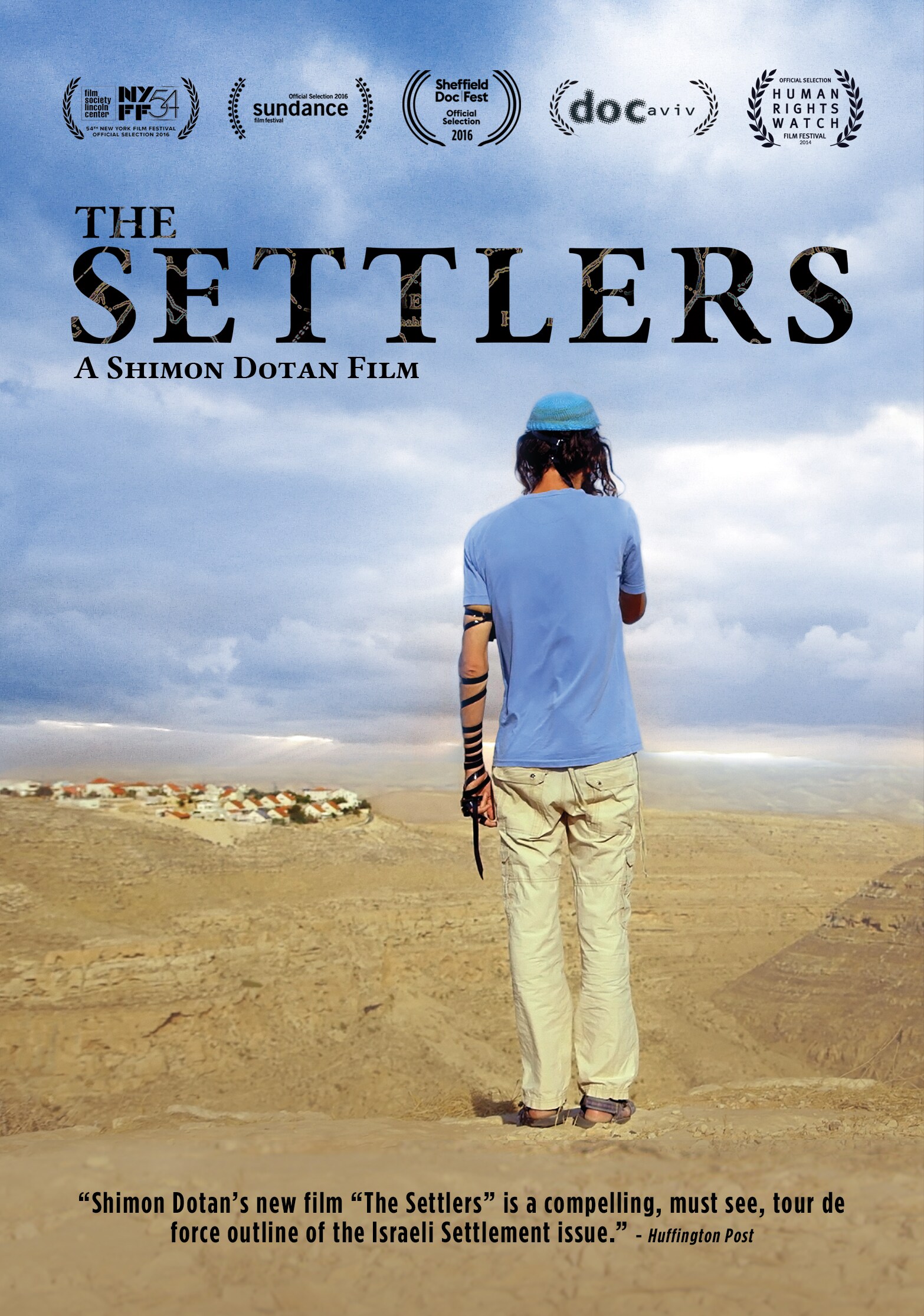 The Settlers – 2013 (1 hr. 51 min.)
The Settlers – 2013 (1 hr. 51 min.)
Available online for rent or purchase
Google Play: https://play.google.com/store/movies/details?id=Nm_HjNLG1XQ.P
Vudu: https://www.vudu.com/content/movies/details/The-Settlers/902765
Youtube: https://www.youtube.com/watch?v=ENYOTFNSEkQ
Watch the trailer: https://www.youtube.com/watch?v=8d0Xkvglcc8
A look at Jewish settlers in the West Bank and their allies – Jewish and non-Jewish alike – in Israel, America and Europe. The origins of the settler phenomenon, which reach back almost half a century, are explored along with a look at who the settlers are today and how they impact the Middle East peace process.
The first film of its kind to offer a comprehensive view of the Jewish settlers in the occupied territories of the West Bank. An historical overview, a geopolitical study and an intimate lookat those people at the core of the most daunting challenges facing Israel and the international community today as the Palestinians and Israelis resume talks again.
While highly praised by some in the Palestinian rights movement, this film also has received negative responses regarding what is missing from the film and the views of the director.
See a review by Uri Klein in Haaretz (premium content, subscription required): ‘Settlers’ Documentary Turns a Blind Eye to the Horror ofWest Bank Life
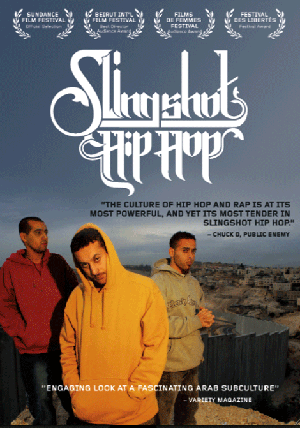 ★ Slingshot Hip Hop – 2008 (1 hr, 40 min)
★ Slingshot Hip Hop – 2008 (1 hr, 40 min)
By Palestinians
http://www.slingshothiphop.com/
By Jackie Reem Salloum, Rumzi Araj, Waleed Zaiter. A musical docu-drama featuring the first Palestinian Hip Hop band, DAM. This film takes a fresh look at the occupation, exploring the hopes and aspirations of young Palestinians living in Gaza, the West Bank and inside Israel as they discover Hip Hop and employ it as a tool to surmount divisions imposed by occupation and poverty. From internal checkpoints and Separation Walls to gender norms and generational differences, this is the story of young people crossing the borders that separate them.
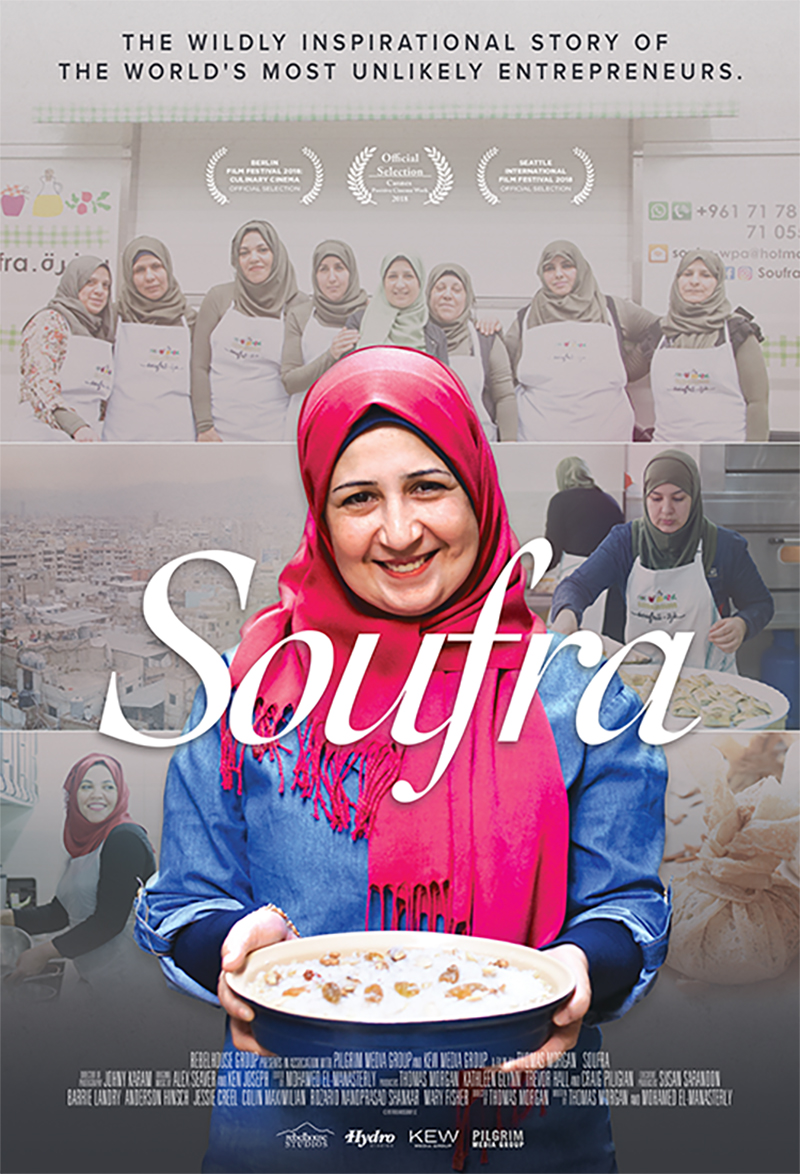 Soufra – 2017 (1 hr, 13 min)
Soufra – 2017 (1 hr, 13 min)
https://soufrafilm.com
Available for rent or purchase
Watch the trailer: https://www.youtube.com/watch?v=m9lzc2sft24
South of Beirut, Lebanon there is a 68 year old refugee camp housing refugees from Palestine, Syria and Iraq. Many have lived in this camp their entire lives– Mariam AlShaar is one of them. Now, Mariam has pulled the women of this camp together to do what has never been done before. They started with a small kitchen from a micro-loan. With nearly insurmountable political odds against them– they look to start the first refugee food truck. Their journey is one of many ups and downs but it is the community that is built, their sense of hope and how they see themselves that makes this a moving, touching film about their journey. Mariam has been known as ‘the crazy lady’ and now she will show just how crazy she is.
A stirring tale of empowerment, the documentary “Soufra” shows how societal change can begin with small steps. Mariam Shaar leads a modest food business in Bourj el Barajneh, a refugee camp south of Beirut, Lebanon, comprising decrepit buildings, narrow alleys and a dangerous overhead mishmash of electrical wires. Despite her status as a Palestinian — barred, as with Syrian refugees, from better jobs in Beirut — Ms. Shaar grows her company, Soufra (which means a table of delicious plenty), with other women struggling to transcend their social station.
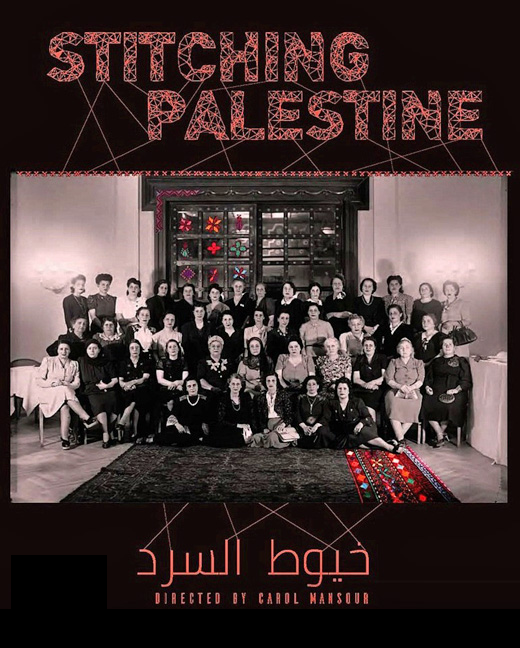 Stitching Palestine – 2017
Stitching Palestine – 2017
https://www.stitchingpalestine.com/
Watch the film, with minimal donation requested: https://www.stitchingpalestine.com/donate
Watch the trailer: https://www.youtube.com/watch?v=OAcS7mGHXiw
Twelve Palestinian women sit before us and talk of their life before the Diaspora, of their memories, of their lives and of their identity.
Their narratives are connected by the enduring thread of the ancient art of embroidery.
Twelve resilient, determined and articulate women from disparate walks of life: lawyers, artists, housewives, activists, architects, and politicians stitch together the story of their homeland, of their dispossession, and of their unwavering determination that justice will prevail.
Through their stories, the individual weaves into the collective, yet remaining distinctly personal. Twelve women, twelve life-spans and stories from Palestine; a land whose position was fixed on the map of the world, but is now embroidered on its face.
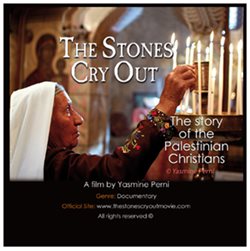 The Stones Cry Out – 2013 (56 min)
The Stones Cry Out – 2013 (56 min)
http://www.thestonescryoutmovie.com/
Christianity was born in Palestine two thousand years ago. From there it spread throughout the Middle East and to the rest of the world. Yet many are unaware Christians still live in the land. For more than 60 years the Palestinians, Christians and Muslims, have suffered displacement, expulsion, wars, occupation and oppression. The voices of Palestinian Christians have all too often been drowned out in the turmoil of events. This is their story, in their voices, from the Nakba of 1948 until today.
In 1948, tens of thousands of Palestinian villagers were driven from their homes in what was officially dubbed “Operation Broom”, intended to literally sweep tens of thousands of Palestinians from their homes in the fertile hills and valleys of the Galilee, and make way for settlers in the newly created state of Israel. Elias Chacour, now the Archbishop of the Galilee, was just a little boy when Israeli troops ordered his family out of the Christian village of Kifr Bir’am. He left the village with a blanket on his shoulder, walking to his new home, a cave. Today Kifr Bir’am is an Israeli national park, the houses of the village are crumbling, the church is abandoned.
After the Galilee came the expropriation of the West Bank in 1967, the settlements, the wall. Bethlehem, the birthplace of Christ, is now hemmed in by the wall, cut off from Jerusalem, and robbed of much of its agricultural land. All too often media coverage of the conflict in Palestine has framed it as a fight between Muslims and Jews, largely ignoring the fact that Palestine was the birthplace of Christianity, that Palestinians are both Muslims and Christians, and that Palestinian Christians have played a critical role in their land’s history and the struggle to maintain its identity.
From 1948 up to today, through wars and uprisings, leading Palestinian Christians, including the late President of Beir Zeit University Gabi Baramki, Palestinian leader Hanan Ashrawi, civil society activist Ghassan Andoni, Patriarch Emeritus Michel Sabbah and others recount the unwavering and sometimes desperate struggle of all Palestinians to resist Israel’s occupation and stay on their land.
[It is noteworthy that every person who appears in this film is a Palestinian Christian.]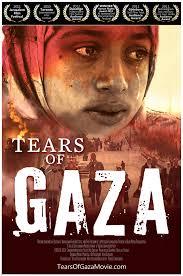 Tears of Gaza -2010 (1 hr, 23 min)
Tears of Gaza -2010 (1 hr, 23 min)
http://tearsofgazamovie.com/
“Few antiwar films register with the disturbing immediacy and visceral terror of “Tears of Gaza,” Vibeke Lokkeberg’s extraordinary docu-set amid the 2008-09. What’s shown is a revelation.”
– John Andersen, Variety
“Perhaps the ultimate anti-war film. A compelling film about war.”
– Kirk Honeycutt, The Hollywood Reporter
Disturbing, powerful and emotionally devastating, Tears of Gaza is less a conventional documentary than a record–presented with minimal gloss – of the 2008 to 2009 bombing of Gaza by the Israeli military. Photographed by several Palestinian cameramen both during and after the offensive, this powerful film by director Vibeke Løkkeberg focuses on the impact of the attacks on the civilian population.
Tears of Gaza makes no overriding speeches or analyses. The situation leading up to the incursion is never mentioned. Similar events certainly occurred in Dresden, Tokyo, Baghdad and Sarajevo, but of course Gaza isn’t those places. Tears of Gaza demands that we examine the costs of war on a civilian populace.
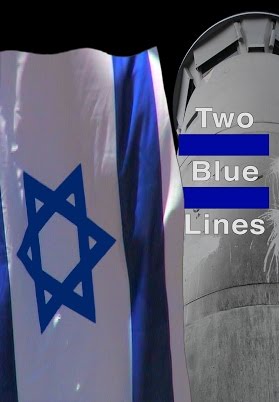 Two Blue Lines – 2015 (1 hr, 39 min)
Two Blue Lines – 2015 (1 hr, 39 min)
http://twobluelinesdocumentary.com/
Shot over a period of 25 years, Two Blue Lines examines the human and political situation of Palestinian people from the years prior to the creation of Israel to the present day. By primarily featuring the narratives of Israelis whose positions run counter to their country’s official policy, filmmaker Tom Hayes provides a portrait of the ongoing conflict not often depicted in mainstream media.
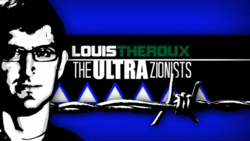 The Ultra Zionists – 2011 (1 hour)
The Ultra Zionists – 2011 (1 hour)
Available online
Louis Theroux spends time with a small and very committed subculture of ultra-nationalist Jewish settlers. He discovers a group of people who consider it their religious and political obligation to populate some of the most sensitive and disputed areas of the West Bank, especially those with a spiritual significance dating back to the Bible.
 **Voices Across the Divide – 2013 (57 mins)
**Voices Across the Divide – 2013 (57 mins)
With study guide
http://voicesacrossthedivide.com/documentary/
Available at the Shop Palestine website of Middle East Children’s Alliance (MECA)
https://www.shoppalestine.org/product-p/dvd_voices_across_divide.htm
Voices Across the Divide is a powerful documentary and oral history project exploring the Israeli/Palestinian conflict through rarely heard personal stories.
The Israeli/Palestinian conflict is one of the most prominent, hot button debates in the US today. There is often little space for compassionate listening or deepening awareness. Access to information about the conflict is shaped by powerful forces and organizations. A better future is possible based on mutual respect and knowledge. Hopefully Voices Across the Divide will contribute to an open dialogue grounded in mutual respect, understanding, and political activism that leads to justice for all people in the region. Narrated by Alice Rothchild, an American Jew raised on the tragedies of the Holocaust and the dream of a Jewish homeland in Israel, Voices Across the Divide follows her personal journey as she begins to understand the Palestinian narrative, while exploring the Palestinian experience of loss, occupation, statelessness, and immigration to the US.
Learn about these important stories, and be inspired to make a difference. Raise a voice to build a just peace in Israel and Palestine. Start by confronting the common experiences of trauma, yearning, immigration, and the realities of injustice and dispossession. Join us in humanizing this tortured and misunderstood history.
Purchase the DVD for personal use and more:
http://voicesacrossthedivide.com/documentary/buy-now/
For Universities and professors:
http://voicesacrossthedivide.com/documentary/for-universities-and-professors/
Voices Across the Divide is now available for streaming in educational institutions. Kanopy is an on demand international video streaming service for educational institutions that provides 12 million students and faculty with access to more than 26,000 films each year.
Voices Across the Divide Timeline (12 pp.)
Voices Across the Divide Study Guide
Includes: suggestions for classroom and public discussion, The General Approach, The Personal Narrative, Identity and the Other, Your role in your social context and Our role as global citizens.
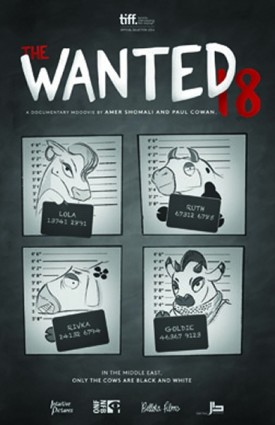 The Wanted 18 – 2014 (1 hr, 15 min)
The Wanted 18 – 2014 (1 hr, 15 min)
http://www.wanted18.com/
A unique production that combines stop-motion animation, interviews, original drawings, and archival footage to bring to life one of the strangest chapters in the history of the Israeli-Palestinian conflict. The Wanted 18 is a 2014 Canadian-Palestinian animated documentary about the efforts of Palestinians in Beit Sahour to start a small local dairy industry during the First Intifada, hiding a herd of 18 dairy cows from Israeli security forces when the dairy collective was deemed a threat to Israel’s national security.
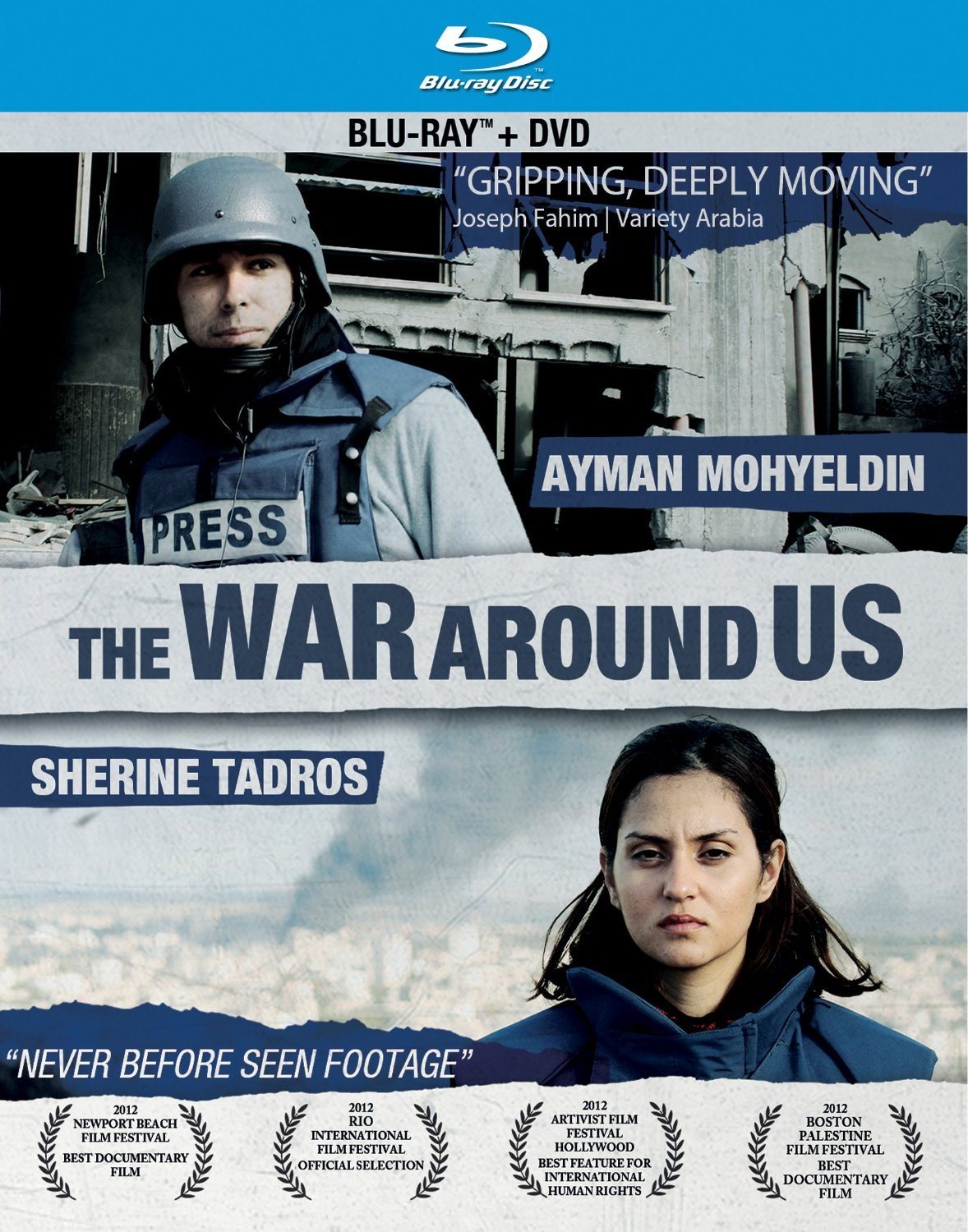 The War Around Us – 2013 (1 hr, 15 min)
The War Around Us – 2013 (1 hr, 15 min)
http://thewararoundus.com/
Award-winning filmmaker Abdallah Omeish (Occupation 101) chronicles the experiences of Al Jazeera’s Cairo-born, Arab-American Ayman Mohyeldin and Arab-British Sherine Tadros as they report from Gaza City throughout the devastating assault. With never-before-seen footage and gripping personal testimonies, the film bears witness to Israel’s ongoing siege of Gaza in the wake of its withdrawal in 2005, and pays tribute to the power of journalism – and friendship – under conditions of enormous conflict and stress. The result is a deeply human glimpse into wartime reporting and life in one of the most besieged places on earth. Essential viewing for courses in journalism, media, and communication.
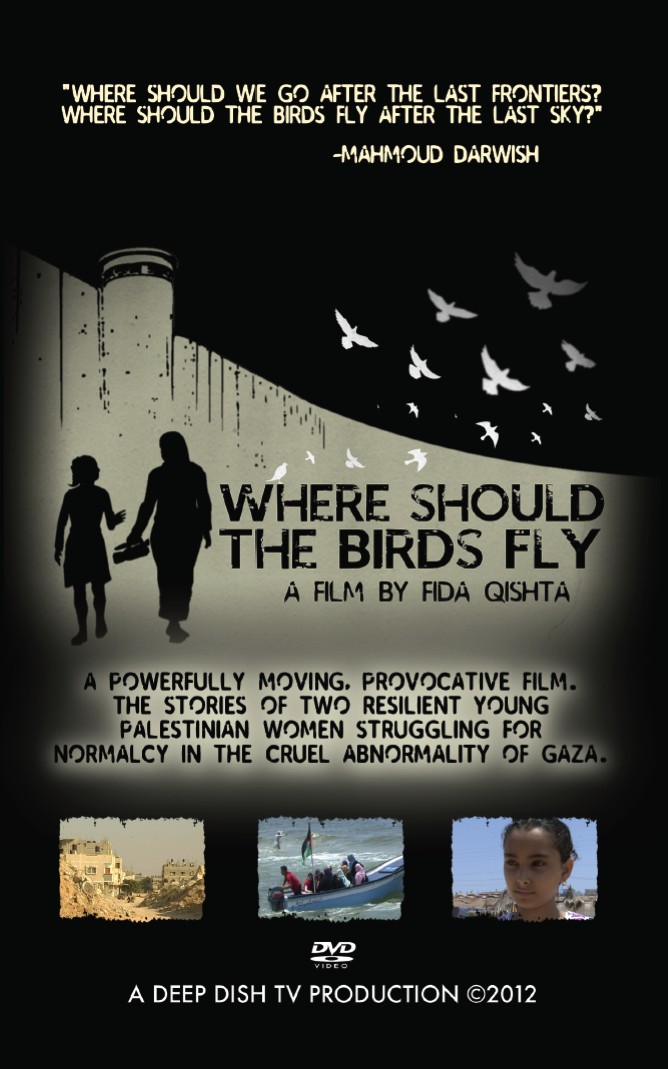 Where Should the Birds Fly – 2013 (58 min)
Where Should the Birds Fly – 2013 (58 min)
http://whereshouldthebirdsfly.org/
Where Should the Birds Fly? documents the separate stories and shared experience of two women in Gaza. It opens by briefly introducing us two the two major characters — Mona Al Samouni and Fida Qishta. Mona Al Samouni is an 11 year old girl whose family died when her home was hit by Israeli rockets during Operation Cast Lead. Fida Qishta, the filmmaker, is a Gazan videographer, teacher, and human rights worker. Born and raised in Rafah, Gaza, she began her filmmaking career as a wedding videographer and soon moved on to working with international human rights observers in Gaza, documenting day to day life under siege.
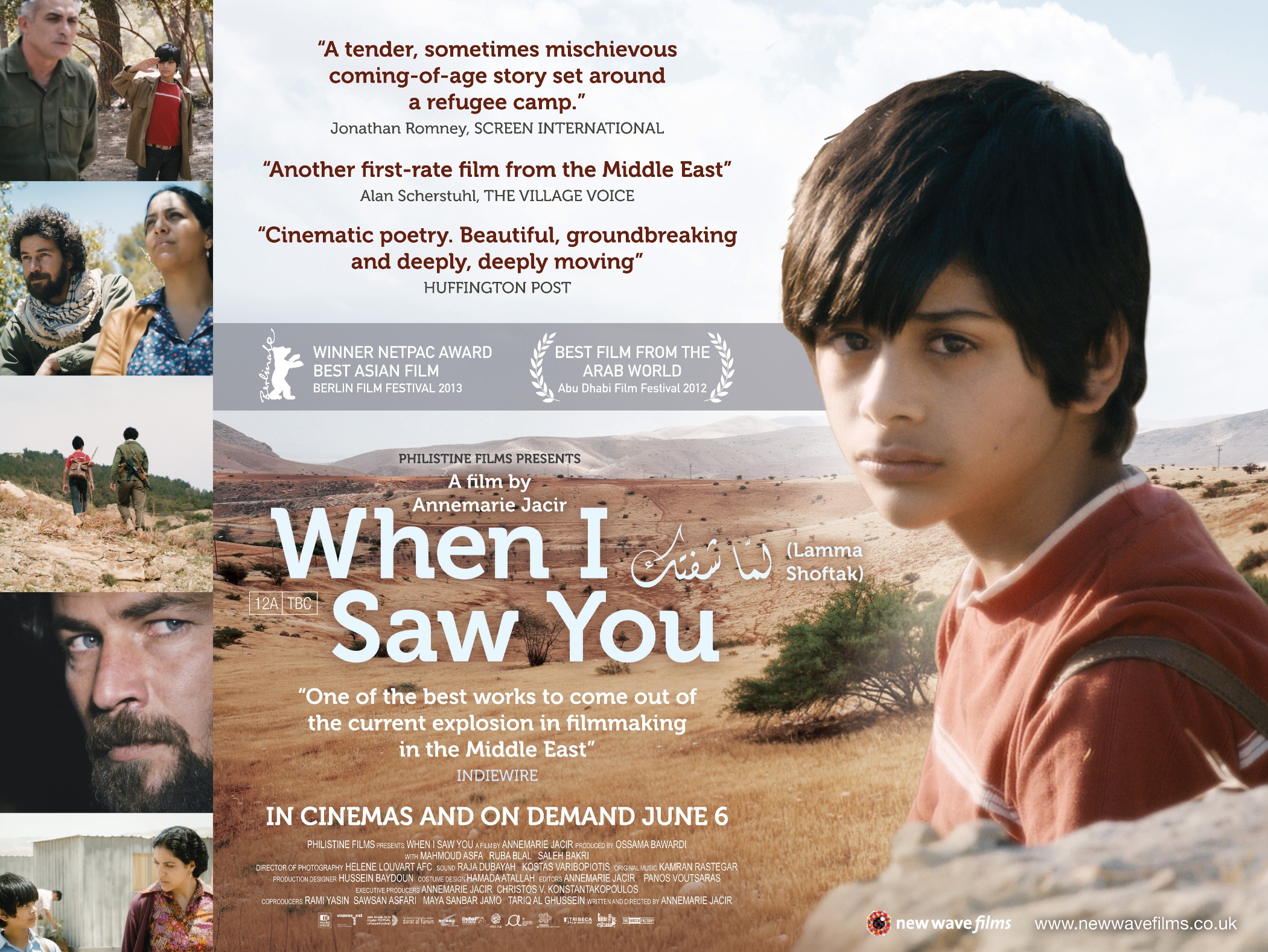
★ When I Saw You – 2012 (1 hr, 38 min)
By Palestinians
Available online
Another from the director of Like Twenty Impossibles is the feature length film When I Saw You. Based in 1967 When I Saw You is the story of 11-year-old Tarek, who, due to the chaos of war, has been forced to flee his home in the Palestinian Territories to neighboring Jordan. Separated from his father Tarek strives to escape the ‘temporary’ refugee camps to find his dad, and through this acquires a unique set of friends to travel his path with. The film is an optimistic look at the power of the human spirit, working against adversity in order to attain freedom. The film was created using exclusively Palestinian funding and producers, a deliberate attempt by Jacir to show the power of the Palestinian film industry without outside influence.
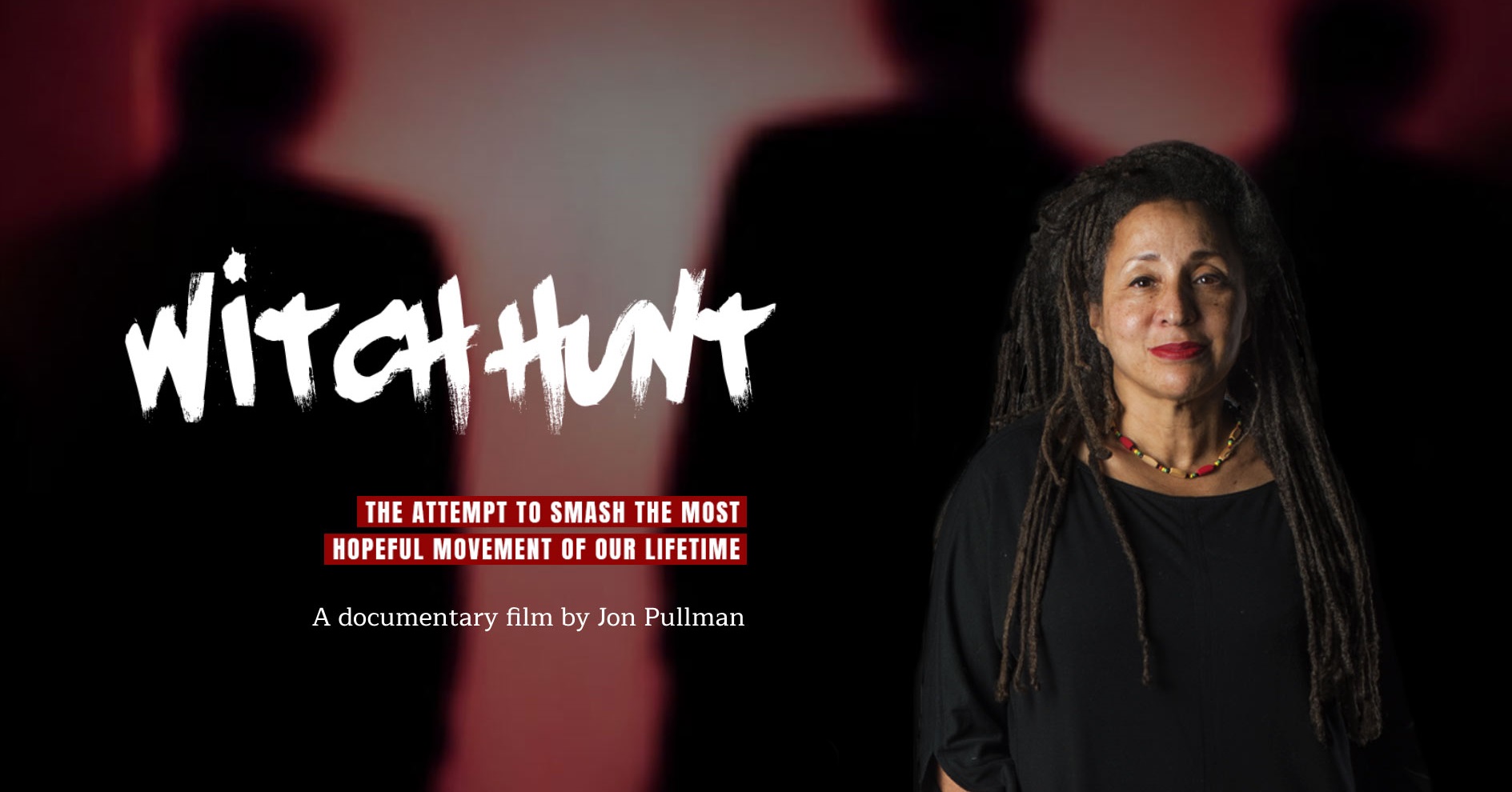 WitchHunt: The Attempt to Smash the Most Hopeful Movement of Our Lifetime – 2019 (60 min)
WitchHunt: The Attempt to Smash the Most Hopeful Movement of Our Lifetime – 2019 (60 min)
https://witchhuntfilm.org/
See it on that website and on Vimeo:
https://vimeo.com/324402664
See also:
WitchHunt 2020 (7 min)
A short sequel to the original film:
https://witchhuntfilm.org/witchhunt2020/
In 2015, while the far right was gaining ground around the world, socialist MP Jeremy Corbyn was elected as leader of the UK Labour Party in a landslide victory. Accusations of antisemitism within the party immediately began to circulate. Well-known anti-racists and left-wing Jews, such as Jackie Walker, were amongst the chief targets.
WitchHunt sets out to investigate the stories and the people behind the headlines, examining the nature of the accusations. Is this a witch hunt, as some claim? If so, who is behind it, and what is the political purpose of such a campaign? Has the media failed in its duty to fairness and accuracy in reporting on such serious allegations? Through a series of interviews, analysis and witness testimony, WitchHunt explores the connections between the attacks on Labour, the ongoing tragedy of Palestine and the wider struggle against race-based oppression. It argues that if it is to mean anything at all, the fight against racism must be a shared one that includes all peoples.
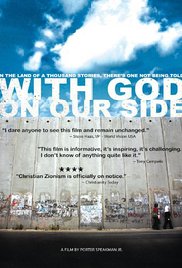 With God on Our Side – 2010 (1 hr, 21 min)
With God on Our Side – 2010 (1 hr, 21 min)
Available online
American Religious Perspective and Hope for Reconciliation. With God On Our Side takes a look at the theology of Christian Zionism, which teaches that because the Jews are God’s chosen people, they have a divine right to the land of Israel. Aspects of this belief system lead some Christians in the West to give uncritical support to Israeli.
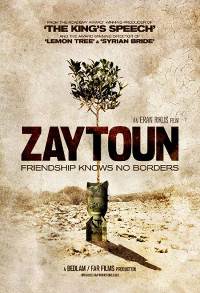 Zaytoun – 2012 (1 hr, 50 min)
Zaytoun – 2012 (1 hr, 50 min)
Available online
During the 1982 Lebanon War, an Israeli fighter pilot, Yoni, is shot down over Beirut and captured by the Palestine Liberation Organization. Fahed, a precocious young Palestinian refugee who is angered by the death of his father in an Israeli air attack, agrees to help Yoni escape and lead him out of the city if Yoni will get him over the border and back to his family’s ancestral village, where Fahed intends to plant an olive tree that his father had been tending in Beirut. As they embark on a hazardous road trip across the war-ravaged country, Yoni and Fahed move from suspicion and mutual antagonism to a tentative camaraderie as they make their way closer to the place they both call home.
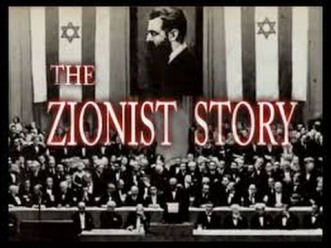 The Zionist Story – 2009 (1 hr, 15 min)
The Zionist Story – 2009 (1 hr, 15 min)
Available online
The Zionist Story, an independent film by Ronen Berelovich, is the story of ethnic cleansing, colonialism and apartheid to produce a demographically Jewish State.Ronen successfully combines archival footage with commentary from himself and others such as Ilan Pappe, Terry Boullata, Alan Hart and Jeff Halper.



